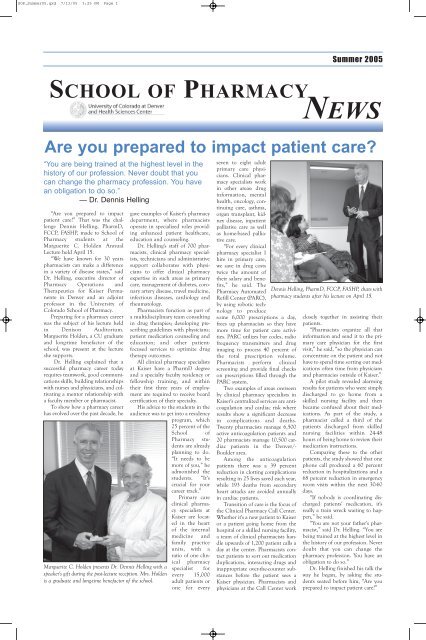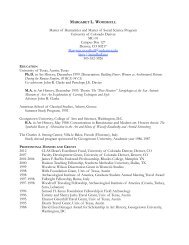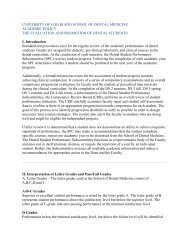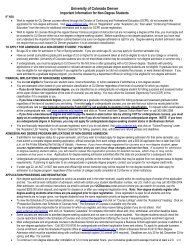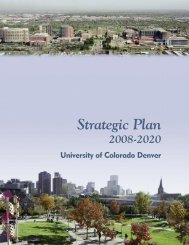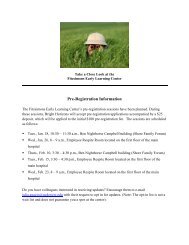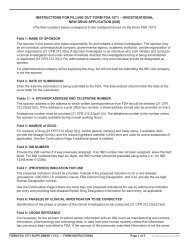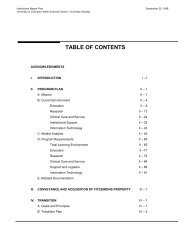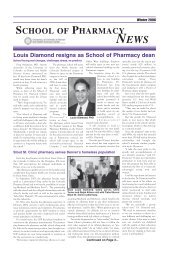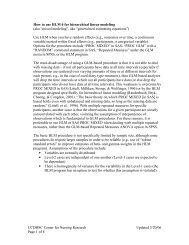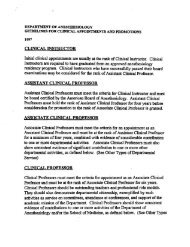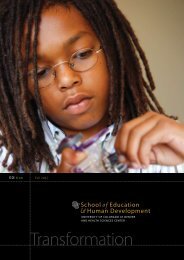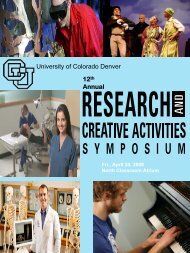Summer 2005 - University of Colorado Denver
Summer 2005 - University of Colorado Denver
Summer 2005 - University of Colorado Denver
You also want an ePaper? Increase the reach of your titles
YUMPU automatically turns print PDFs into web optimized ePapers that Google loves.
SOP_<strong>Summer</strong>05.qxd 7/13/05 3:25 PM Page 1<br />
<strong>Summer</strong> <strong>2005</strong><br />
SCHOOL OF PHARMACY<br />
NEWS<br />
Are you prepared to impact patient care?<br />
“You are being trained at the highest level in the<br />
history <strong>of</strong> our pr<strong>of</strong>ession. Never doubt that you<br />
can change the pharmacy pr<strong>of</strong>ession. You have<br />
an obligation to do so.”<br />
— Dr. Dennis Helling<br />
“Are you prepared to impact<br />
patient care?” That was the challenge<br />
Dennis Helling, PharmD,<br />
FCCP, FASHP, made to School <strong>of</strong><br />
Pharmacy students at the<br />
Marguerite C. Holden Annual<br />
Lecture held April 15.<br />
“We have known for 30 years<br />
pharmacists can make a difference<br />
in a variety <strong>of</strong> disease states,” said<br />
Dr. Helling, executive director <strong>of</strong><br />
Pharmacy Operations and<br />
Therapeutics for Kaiser Permanente<br />
in <strong>Denver</strong> and an adjoint<br />
pr<strong>of</strong>essor in the <strong>University</strong> <strong>of</strong><br />
<strong>Colorado</strong> School <strong>of</strong> Pharmacy.<br />
Preparing for a pharmacy career<br />
was the subject <strong>of</strong> his lecture held<br />
in Denison Auditorium.<br />
Marguerite Holden, a CU graduate<br />
and long-time benefactor <strong>of</strong> the<br />
school, was present at the lecture<br />
she supports.<br />
Dr. Helling explained that a<br />
successful pharmacy career today<br />
requires teamwork, good communications<br />
skills, building relationships<br />
with nurses and physicians, and cultivating<br />
a mentor relationship with<br />
a faculty member or pharmacist.<br />
To show how a pharmacy career<br />
has evolved over the past decade, he<br />
Marguerite C. Holden presents Dr. Dennis Helling with a<br />
speaker's gift during the post-lecture reception. Mrs. Holden<br />
is a graduate and long-time benefactor <strong>of</strong> the school.<br />
gave examples <strong>of</strong> Kaiser's pharmacy<br />
department, where pharmacists<br />
operate in specialized roles providing<br />
enhanced patient healthcare,<br />
education and counseling.<br />
Dr. Helling's staff <strong>of</strong> 700 pharmacists,<br />
clinical pharmacy specialists,<br />
technicians and administrative<br />
support collaborates with physicians<br />
to <strong>of</strong>fer clinical pharmacy<br />
expertise in such areas as primary<br />
care, management <strong>of</strong> diabetes, coronary<br />
artery disease, travel medicine,<br />
infectious diseases, cardiology and<br />
rheumatology.<br />
Pharmacists function as part <strong>of</strong><br />
a multidisciplinary team consulting<br />
in drug therapies; developing prescribing<br />
guidelines with physicians;<br />
patient medication counseling and<br />
education; and other patientfocused<br />
services to optimize drug<br />
therapy outcomes.<br />
All clinical pharmacy specialists<br />
at Kaiser have a PharmD degree<br />
and a specialty faculty residency or<br />
fellowship training, and within<br />
their first three years <strong>of</strong> employment<br />
are required to receive board<br />
certification <strong>of</strong> their specialty.<br />
His advice to the students in the<br />
audience was to get into a residency<br />
program, which<br />
25 percent <strong>of</strong> the<br />
School <strong>of</strong><br />
Pharmacy students<br />
are already<br />
planning to do.<br />
“It needs to be<br />
more <strong>of</strong> you,” he<br />
admonished the<br />
students. “It's<br />
crucial for your<br />
career track.”<br />
Primary care<br />
clinical pharmacy<br />
specialists at<br />
Kaiser are located<br />
in the heart<br />
<strong>of</strong> the internal<br />
medicine and<br />
family practice<br />
units, with a<br />
ratio <strong>of</strong> one clinical<br />
pharmacy<br />
specialist for<br />
every 15,000<br />
adult patients or<br />
one for every<br />
seven to eight adult<br />
primary care physicians.<br />
Clinical pharmacy<br />
specialists work<br />
in other areas: drug<br />
information, mental<br />
health, oncology, continuing<br />
care, asthma,<br />
organ transplant, kidney<br />
disease, inpatient<br />
palliative care as well<br />
as home-based palliative<br />
care.<br />
“For every clinical<br />
pharmacy specialist I<br />
hire in primary care,<br />
we save in drug costs<br />
twice the amount <strong>of</strong><br />
their salary and benefits,”<br />
he said. The<br />
Pharmacy Automated<br />
Refill Center (PARC),<br />
by using robotic technology<br />
to produce<br />
some 6,000 prescriptions a day,<br />
frees up pharmacists so they have<br />
more time for patient care activities.<br />
PARC utilizes bar codes, radio<br />
frequency transmitters and drug<br />
imaging to process 40 percent <strong>of</strong><br />
the total prescription volume.<br />
Pharmacists perform clinical<br />
screening and provide final checks<br />
on prescriptions filled through the<br />
PARC system.<br />
Two examples <strong>of</strong> areas overseen<br />
by clinical pharmacy specialists in<br />
Kaiser's centralized services are anticoagulation<br />
and cardiac risk where<br />
results show a significant decrease<br />
in complications and deaths.<br />
Twenty pharmacists manage 6,500<br />
active anticoagulation patients and<br />
20 pharmacists manage 10,500 cardiac<br />
patients in the <strong>Denver</strong>/-<br />
Boulder area.<br />
Among the anticoagulation<br />
patients there was a 39 percent<br />
reduction in clotting complications<br />
resulting in 25 lives saved each year,<br />
while 193 deaths from secondary<br />
heart attacks are avoided annually<br />
in cardiac patients.<br />
Transition <strong>of</strong> care is the focus <strong>of</strong><br />
the Clinical Pharmacy Call Center.<br />
Whether it's a new patient to Kaiser<br />
or a patient going home from the<br />
hospital or a skilled nursing facility,<br />
a team <strong>of</strong> clinical pharmacists handle<br />
upwards <strong>of</strong> 1,200 patient calls a<br />
day at the center. Pharmacists contact<br />
patients to sort out medication<br />
duplications, interacting drugs and<br />
inappropriate over-the-counter substances<br />
before the patient sees a<br />
Kaiser physician. Pharmacists and<br />
physicians at the Call Center work<br />
Dennis Helling, PharmD, FCCP, FASHP, chats with<br />
pharmacy students after his lecture on April 15.<br />
closely together in assisting their<br />
patients.<br />
“Pharmacists organize all that<br />
information and send it to the primary<br />
care physician for the first<br />
visit,” he said, “so the physician can<br />
concentrate on the patient and not<br />
have to spend time sorting out medications<br />
<strong>of</strong>ten time from physicians<br />
and pharmacies outside <strong>of</strong> Kaiser.”<br />
A pilot study revealed alarming<br />
results for patients who were simply<br />
discharged to go home from a<br />
skilled nursing facility and then<br />
became confused about their medications.<br />
As part <strong>of</strong> the study, a<br />
pharmacist called a third <strong>of</strong> the<br />
patients discharged from skilled<br />
nursing facilities within 24-48<br />
hours <strong>of</strong> being home to review their<br />
medication instructions.<br />
Comparing these to the other<br />
patients, the study showed that one<br />
phone call produced a 60 percent<br />
reduction in hospitalizations and a<br />
68 percent reduction in emergency<br />
room visits within the next 30-60<br />
days.<br />
“If nobody is coordinating discharged<br />
patients' medication, it's<br />
really a train wreck waiting to happen,”<br />
he said.<br />
“You are not your father's pharmacist,”<br />
said Dr. Helling. “You are<br />
being trained at the highest level in<br />
the history <strong>of</strong> our pr<strong>of</strong>ession. Never<br />
doubt that you can change the<br />
pharmacy pr<strong>of</strong>ession. You have an<br />
obligation to do so.”<br />
Dr. Helling finished his talk the<br />
way he began, by asking the students<br />
seated before him, “Are you<br />
prepared to impact patient care?”
SOP_<strong>Summer</strong>05.qxd 7/13/05 3:26 PM Page 2<br />
PAGE2<br />
Less than a year after her<br />
appointment to the Department <strong>of</strong><br />
Pharmaceutical Sciences, Assistant<br />
Pr<strong>of</strong>essor LaToya Jones, PhD, has<br />
landed a one-year $75,000 grant to<br />
collaborate with a CU-Boulder<br />
researcher to go where few have<br />
gone before.<br />
Funded by the Butcher Awards in<br />
Biotechnology, Dr. Jones and Dr.<br />
Deborah Wuttke, associate pr<strong>of</strong>essor<br />
in chemistry and biochemistry<br />
at CU-Boulder will study vaccine<br />
antigen/adjuvant interactions.<br />
They will look at structural and<br />
dynamical changes that occur in<br />
proteins that have been adsorbed<br />
onto adjuvants using nuclear magnetic<br />
resonance (NMR).<br />
“We're stepping out there into<br />
new territory,” said Dr. Jones. “I do<br />
not know <strong>of</strong> a single publication on<br />
this. Even with the research in my<br />
lab in general, very few papers have<br />
been published looking at the structure<br />
and stability <strong>of</strong> antigens from a<br />
biophysical standpoint in the presence<br />
<strong>of</strong> the adjuvant.”<br />
An adjuvant is a substance,<br />
given with the antigen, that<br />
The CU School <strong>of</strong> Pharmacy is<br />
one <strong>of</strong> 10 health pr<strong>of</strong>essional<br />
schools selected to participate in a<br />
national collaborative to address<br />
the review, promotion and tenure<br />
processes applied to faculty who are<br />
involved in community-based scholarship<br />
as part <strong>of</strong> their careers.<br />
Funded by a three-year<br />
$563,842 grant to Community-<br />
Campus Partnerships for Health<br />
from the U.S. Department <strong>of</strong><br />
Education's Fund for the<br />
Improvement <strong>of</strong> Postsecondary<br />
Education (FIPSE), the group <strong>of</strong><br />
schools will create templates to<br />
show how faculty can be recognized<br />
and promoted for communitybased<br />
scholarship.<br />
“Community-based work is valuable<br />
and important, and universities<br />
should recognize faculty who<br />
want to do work in this area rather<br />
than simply categorizing it as service,”<br />
said Catherine Jarvis,<br />
PharmD, assistant dean for Student<br />
Services and associate pr<strong>of</strong>essor at<br />
the School <strong>of</strong> Pharmacy. “This kind<br />
<strong>of</strong> work helps the community, the<br />
university and the students, so we<br />
shouldn't be mired in a traditional<br />
viewpoint that clinical and laboratory-based<br />
scholarship are the primary<br />
acceptable criteria for promotion<br />
and tenure.”<br />
Historically in academia, in<br />
SCHOOL OF PHARMACY<br />
NEWS<br />
enhances the response to the injected<br />
antigen.<br />
A vaccine may work just fine<br />
when it's in the presence <strong>of</strong> one <strong>of</strong><br />
the two adjuvants approved for use<br />
in the U.S. (aluminum hydroxide<br />
order to be promoted and advance<br />
in their career, members <strong>of</strong> the faculty<br />
are recognized for specific types<br />
<strong>of</strong> research in traditional scientific<br />
settings. That research has traditionally<br />
been focused in scientific<br />
labs or in hospitals and clinics.<br />
Healthcare faculty members who<br />
have wanted to use their careers to<br />
do research in the community have<br />
found it more difficult to advance<br />
their careers.<br />
“What happens is that this type<br />
<strong>of</strong> good work in the community<br />
doesn't progress unless faculty who<br />
are doing it are recognized and promoted<br />
for these activities,” said Dr.<br />
Jarvis. “There's value in studying<br />
things in a real community that<br />
helps with the assessment <strong>of</strong> a drug<br />
or other health care practices<br />
beyond just studying them in controlled<br />
laboratory settings. We need<br />
to know things about the community,<br />
about people's ethnicity and<br />
culture and their beliefs about<br />
health care.”<br />
Each school in the collaborative<br />
has formed a team <strong>of</strong> faculty and<br />
administrators to lead the change<br />
process. Members <strong>of</strong> the School <strong>of</strong><br />
Pharmacy's team include<br />
Marguerite Childs, associate vice<br />
chancellor <strong>of</strong> Academic Affairs for<br />
the CU Health Sciences Center;<br />
and pharmacy faculty members:<br />
Sam Ellis, assistant pr<strong>of</strong>essor;<br />
David Hill, associate dean and associate<br />
pr<strong>of</strong>essor; Catherine Jarvis;<br />
Christopher Turner, associate pr<strong>of</strong>essor;<br />
and Heather Ulrich, assistant<br />
pr<strong>of</strong>essor.<br />
At the end <strong>of</strong> the three-year project,<br />
the schools participating in the<br />
collaborative will have significantly<br />
impacted their promotion and<br />
tenure systems to recognize and<br />
reward community-engaged scholarship<br />
and stimulated similar<br />
actions in pr<strong>of</strong>essional schools<br />
across the country.<br />
Other schools participating in<br />
the collaborative are Auburn<br />
SCHOOL OF PHARMACY NEWS<br />
Louis Diamond, PhD<br />
Dean, School <strong>of</strong> Pharmacy<br />
Susan Saunders<br />
Assistant to the Dean<br />
School <strong>of</strong> Pharmacy<br />
Catherine Bedell<br />
Director <strong>of</strong> UCHSC Office<br />
<strong>of</strong> Public Relations<br />
Mitzi Schindler<br />
Director <strong>of</strong> Publications<br />
Office <strong>of</strong> Public Relations<br />
Kenna Bruner<br />
Staff Writer<br />
Office <strong>of</strong> Public Relations<br />
School <strong>of</strong> Pharmacy<br />
Mail Stop C-238<br />
UCDHSC<br />
4200 E. Ninth Ave.<br />
<strong>Denver</strong>, CO 80262<br />
<strong>Summer</strong> <strong>2005</strong><br />
Adjuvant research exploring new territory<br />
Assistant pr<strong>of</strong>essor LaToya Jones, PhD, is collaborating with<br />
a CU-Boulder lab to study vaccine antigen/adjuvant interactions.<br />
and aluminum<br />
phosphate), but<br />
not so well in the<br />
presence <strong>of</strong> the<br />
other. The reason<br />
is unknown.<br />
By looking at<br />
biophysical<br />
parameters to<br />
detect structural<br />
and stability<br />
changes, Drs.<br />
Jones and<br />
Wuttke hope to<br />
unravel the mystery<br />
<strong>of</strong> why this<br />
occurs.<br />
The results <strong>of</strong><br />
their biophysical<br />
study could provide<br />
researchers<br />
with another tool<br />
to screen drug<br />
formulations<br />
before going into the more expensive<br />
and long-term animal studies.<br />
“This grant allows us to come<br />
together from different disciplines<br />
and different campuses to try to<br />
answer the same question,” said Dr.<br />
Jones. “It will give us the opportunity<br />
to see if our approach is worth<br />
pursuing.”<br />
By taking various mutants <strong>of</strong> a<br />
protein adsorbed onto the adjuvant,<br />
they will explore how alterations<br />
<strong>of</strong> the conformation and stability<br />
<strong>of</strong> the protein affects the consequences<br />
<strong>of</strong> its interactions with<br />
the adjuvant. Dr. Jones will conduct<br />
the broader, biophysical characterizations<br />
<strong>of</strong> proteins in suspension<br />
in her lab and then Dr.<br />
Wuttke will use the high field<br />
NMR spectrometers at the Boulder<br />
campus to provide a detailed picture<br />
<strong>of</strong> how the structure is<br />
changed in the presence <strong>of</strong> the<br />
adjuvant. They will also seek to<br />
delve into the differences in degradation<br />
by proteases <strong>of</strong> antigen presenting<br />
cells.<br />
“The more we understand<br />
what's going on in these systems,<br />
the better chance we have <strong>of</strong> accelerating<br />
the development <strong>of</strong> more<br />
efficacious vaccines, said Dr. Jones.<br />
SOP participates in national collaborative seeking to change academic culture<br />
<strong>University</strong> Harrison School <strong>of</strong><br />
Pharmacy, Case Western <strong>University</strong><br />
School <strong>of</strong> Nursing, Indiana<br />
<strong>University</strong> School <strong>of</strong> Dentistry,<br />
Loma Linda <strong>University</strong> School <strong>of</strong><br />
Public Health, <strong>University</strong> <strong>of</strong><br />
Cincinnati College <strong>of</strong> Allied<br />
Health Sciences, <strong>University</strong> <strong>of</strong><br />
Massachusetts Worcester School <strong>of</strong><br />
Nursing, <strong>University</strong> <strong>of</strong> Minnesota<br />
Academic Health Center,<br />
<strong>University</strong> <strong>of</strong> North Carolina-<br />
Chapel Hill School <strong>of</strong> Dentistry<br />
and Vanderbilt <strong>University</strong> School<br />
<strong>of</strong> Medicine.<br />
SOP.alumni@UCHSC.edu<br />
http://www.uchsc.edu/sop
SOP_<strong>Summer</strong>05.qxd 7/13/05 3:26 PM Page 3<br />
<strong>Summer</strong> <strong>2005</strong><br />
SCHOOL OF PHARMACYNEWS<br />
PAGE 3<br />
Researcher Cynthia Ju explores mechanisms <strong>of</strong> adverse drug reactions<br />
A study published in the 1998<br />
Journal <strong>of</strong> the American Medical<br />
Association reported that more than<br />
one million hospital admissions<br />
and 100,000 deaths each year are<br />
due to severe adverse drug reactions<br />
(ADR). This makes ADR the<br />
fourth leading cause <strong>of</strong> death, after<br />
cancer, stroke and heart disease.<br />
Because so little is known about<br />
these reactions, it is quite difficult<br />
to predict which drugs will cause a<br />
reaction and which patients will be<br />
susceptible. With a five-year RO1<br />
grant <strong>of</strong> more than $1.4 million,<br />
Cynthia Ju, PhD, assistant pr<strong>of</strong>essor<br />
<strong>of</strong> Pharmaceutical Sciences,<br />
hopes to shed light on these lifethreatening<br />
reactions.<br />
“Due to our limited understanding<br />
<strong>of</strong> the underlying mechanisms,<br />
it is impossible to predict<br />
which drug candidates will cause<br />
immune reactions until thousands<br />
<strong>of</strong> patients start to use the drug during<br />
clinical trials or after the drug is<br />
released onto the market,” she said.<br />
“The earlier we detect these reactions,<br />
the better it is for patients<br />
and the drug industry.”<br />
It is estimated that 6-10 percent<br />
<strong>of</strong> ADR cases are immune-mediated<br />
reactions, which include<br />
halthotane-induced allergic hepatitis<br />
(one in 35,000 with a mortality<br />
rate <strong>of</strong> 40-50 percent), procainamide-induced<br />
lupus (one in<br />
six) and severe hypersensitivity syndrome<br />
induced by a number <strong>of</strong><br />
drugs, such as carbamazepine, abacavir<br />
and nirverapine. (Halthane is<br />
no longer used in adults in Europe<br />
and the U.S.)<br />
Immune-Mediated Adverse<br />
Drug Reaction (IADR) is due to the<br />
formation <strong>of</strong> immunogenic drugprotein<br />
adducts, however,<br />
researchers are puzzled why most<br />
people do not show clinical symptoms<br />
<strong>of</strong> IADR. Dr. Ju hopes the<br />
five-year National Institute <strong>of</strong><br />
Health-funded study will reveal the<br />
mechanisms <strong>of</strong> IADR and help<br />
identify predisposing factors that<br />
determine an individual's<br />
susceptibility.<br />
“The central question<br />
to understanding<br />
this kind <strong>of</strong> reaction is<br />
how drugs in the form<br />
<strong>of</strong> small molecularweight<br />
chemicals cause<br />
immune reactions,”<br />
said Dr. Ju. “Our<br />
immune system only<br />
recognizes peptides and<br />
proteins, not chemicals<br />
that small. The hypothesis<br />
is that chemically<br />
reactive drugs, or more<br />
<strong>of</strong>ten, reactive metabolites<br />
<strong>of</strong> drugs, bind to<br />
endogenous proteins<br />
and form immunogenic<br />
drug-protein<br />
adducts.”<br />
It's like poison ivy.<br />
When exposed to the<br />
urushiol chemical in the sap <strong>of</strong> poison<br />
ivy, an individual develops a<br />
poison ivy-induced skin rash. This<br />
occurs because the small molecular<br />
weight chemical in poison ivy forms<br />
a hapten-protein adduct. Haptens<br />
are small molecular weight chemicals<br />
that by themselves are not<br />
Carol Balmer selected as<br />
a Scholar-In-Residence<br />
Carol Balmer, PharmD, director <strong>of</strong> the School <strong>of</strong> Pharmacy's<br />
Office <strong>of</strong> Postgraduate Pr<strong>of</strong>essional Education, was selected as the<br />
<strong>2005</strong> ACPE/AACP Scholar-In-Residence.<br />
The Accreditation Council for Pharmacy Education (ACPE) and<br />
American Association <strong>of</strong> Colleges <strong>of</strong> Pharmacy (AACP) Scholar-In-<br />
Residence Program provides an opportunity for pharmacy educators<br />
to work with ACPE staff and resources in addressing issues that<br />
ACPE and continuing education (CE) providers (whether or not<br />
based in a college or school <strong>of</strong> pharmacy) face in the development<br />
and delivery <strong>of</strong> pharmacy continuing education.<br />
The goals <strong>of</strong> the program, which began in 2004, include providing<br />
an opportunity to increase scholarship <strong>of</strong> individual continuing<br />
education providers and assist ACPE in addressing their goals.<br />
During the residency, the participant researches and addresses issues<br />
<strong>of</strong> importance to the AACP Continuing Pr<strong>of</strong>essional Education<br />
Section and ACPE.<br />
Dr. Balmer's project involves assessing the learning needs <strong>of</strong> CE<br />
providers in developing skills related to performing scholarly activities<br />
and developing educational programming to meet those needs.<br />
immunogenic until they bind with<br />
proteins. The hypothesis is that<br />
drugs act like haptens.<br />
Dr. Ju and her research team are<br />
developing a mouse model <strong>of</strong><br />
halothane-induced hepatitis. The<br />
reason IADR is not well understood<br />
is because there is no animal<br />
model. The rationale for choosing<br />
halothane and mice for the study is<br />
four-fold: halothane hepatitis is a<br />
Graduate students Michael Holt and Hao Yin; Cynthia Ju, PhD; post doc<br />
fellow, Qiang You; and pr<strong>of</strong>essional research assistant Linling Cheng<br />
prototypic IADR; halothane is used<br />
in most studies <strong>of</strong> IADR; mouse<br />
immunological tools are available;<br />
and various strains and transgenic<br />
mice are available.<br />
“Many research groups have previously<br />
tried to develop such a<br />
model without success,” she said.<br />
“We have so far been very pleased<br />
with our results.”<br />
Early data shows that the adaptive<br />
immune system is important.<br />
They are investigating the mechanism<br />
involved in immune-mediated<br />
liver damage and have come up<br />
with a strategy to develop a method<br />
to screen the potential <strong>of</strong> drugs to<br />
cause IADR. On average, it costs<br />
$800 million to develop a drug. At<br />
present, pharmacology and pharmacokinetic/pharmacodynamic<br />
issues are much better understood<br />
and solutions can be found in most<br />
cases. ADR, however, becomes the<br />
most significant hindrance to drug<br />
development. Pfizer has taken great<br />
interest in Dr. Ju's initiative to<br />
develop screening methods and<br />
decided to fund this project.<br />
Dr. Ju's lab is also investigating<br />
the mechanisms <strong>of</strong> immunological<br />
tolerance to drugs. One possible<br />
explanation for why only a small<br />
percentage <strong>of</strong> patients are more susceptible<br />
to developing IADR is that<br />
most people develop immunological<br />
tolerance to drug-modified protein<br />
antigens as a default mechanism.<br />
Understanding what is<br />
involved in drug tolerance will lead<br />
researchers to identify risk factors.<br />
Previously, her lab found that<br />
macrophages in the liver are essential<br />
in inducing tolerance to drugprotein<br />
adducts. Their recent studies<br />
revealed that these cells not only<br />
act as poor antigen-presenting cells<br />
(APC) and fail to induce T cell reaction,<br />
but the cells are also capable<br />
<strong>of</strong> actively suppressing T cell activation<br />
that is induced by other potent<br />
APCs.<br />
Her second NIH grant-funded<br />
study focuses on drug-induced<br />
severe liver injury, which is the<br />
most common cause <strong>of</strong> withdrawal<br />
<strong>of</strong> drugs from the market. Druginduced<br />
liver damage accounts for<br />
25 percent <strong>of</strong> fulminate liver failure<br />
in intensive care units, however,<br />
very little is known about the mechanisms<br />
involved. Dr. Ju's approach<br />
is to use a mouse model <strong>of</strong> acetaminophen-induced<br />
acute inflammatory<br />
liver injury.<br />
“We found that depletion <strong>of</strong><br />
macrophages from the liver leads to<br />
induced tissue damage, suggesting<br />
that these cells are protective,” she<br />
said. “We hypothesize that the protective<br />
effect is through counteracting<br />
inflammation and promoting<br />
tissue repair. Our ultimate goal is to<br />
uncover molecular regulators,<br />
which act on these cells and leads<br />
to protective effects.”
SOP_<strong>Summer</strong>05.qxd 7/13/05 3:26 PM Page 4<br />
SCHOOL OF PHARMACY<br />
4 NEWS<br />
PAGE <strong>Summer</strong> <strong>2005</strong><br />
Finding answers through evidence-based medicine<br />
Gone are the days when a search<br />
for research data meant going to<br />
the nearest medical library to peer<br />
at micr<strong>of</strong>iche. Some relevant studies<br />
would be found, but the cumbersome<br />
process made a comprehensive<br />
survey <strong>of</strong> all available data<br />
too time-consuming to be practical.<br />
Evidence-based medicine represents<br />
not so much a paradigm shift,<br />
but an advancement <strong>of</strong> the tools<br />
used by a clinician, Daniel<br />
Friedland, MD, told the standingroom<br />
only crowd in Denison<br />
Auditorium on April 22. Today's<br />
technology dramatically changes<br />
how research can be accessed and<br />
shared. The internet makes it possible<br />
for pharmacists to find and use<br />
research more thoroughly and effectively<br />
than ever.<br />
“In large part, the revolution <strong>of</strong><br />
evidence-based medicine coincides<br />
with the development <strong>of</strong> the internet,”<br />
said Dr. Friedland, president<br />
and CEO <strong>of</strong> Friedland Consulting<br />
and assistant clinical pr<strong>of</strong>essor in<br />
the Department <strong>of</strong> Medicine at the<br />
<strong>University</strong> <strong>of</strong> California at San<br />
Francisco. Dr. Friedland is author<br />
<strong>of</strong> Evidence-Based Medicine: A<br />
Framework for Clinical Practice.<br />
Evidence-based practice is the<br />
process <strong>of</strong> systematically locating,<br />
appraising, and using research findings<br />
as the basis for clinical decisions.<br />
It emphasizes the use <strong>of</strong><br />
research and evidence to guide clinical<br />
decision making.<br />
Basing clinical healthcare on<br />
research rather than tradition is not<br />
a new concept, but it has become<br />
more significant as pharmacists<br />
have begun looking at patient care<br />
procedures through the lens <strong>of</strong> evidence-based<br />
practice.<br />
“Knowing how to blend the rigorous<br />
research with clinical experience,<br />
expert opinion and understanding<br />
<strong>of</strong> pathophysiology <strong>of</strong> disease<br />
is what is known as clinical<br />
expertise,” he said. “To transfer the<br />
evidence requires four key skills,<br />
which are to frame the right clinical<br />
question; find the best available evidence<br />
to answer the question; evaluate<br />
it to make sure it's valid; and<br />
know how to apply it to patients.”<br />
Finding the pertinent evidence<br />
hinges on how effectively the question<br />
is framed, according to Dr.<br />
Friedland, who demonstrated how<br />
to locate evidence-based information<br />
online in such web sites as<br />
MEDLINE and the Cochrane<br />
Collection.<br />
There are four components to a<br />
well-framed clinical question,<br />
which are patient population; the<br />
“Knowing how to blend the rigorous research<br />
with clinical experience, expert opinion and understanding<br />
<strong>of</strong> pathophysiology <strong>of</strong> disease is what is<br />
known as clinical expertise.”<br />
— Daniel Friedland, MD<br />
Daniel Friedland, MD, right, Dean’s Distinguished Seminar Series speaker for<br />
<strong>2005</strong>, with SOP Dean Louis Diamond, PharmD.<br />
National awards for school's<br />
Experiential Programs<br />
predictor; the comparison predictor<br />
and the outcome. As an example,<br />
Dr. Friedland posed the question<br />
a pharmacist might ask when<br />
looking for research evidence on a<br />
new asthma drug: In patients with<br />
persistent asthma (patient population),<br />
is the new drug (predictor)<br />
more effective than inhaled corticosteroids<br />
(comparison predictor)<br />
with respect to lung function, symptoms<br />
and the asthma exacerbation<br />
(outcome)?<br />
“If you leave out any <strong>of</strong> these<br />
components you can be led astray,”<br />
he said. “You can end up getting<br />
the right supporting evidence to<br />
the wrong question.”<br />
Evidence-based medicine is the<br />
application <strong>of</strong> the best available evidence<br />
to patient care. Rigorous<br />
research is crucial, but may not be<br />
sufficient to fully guide clinical<br />
practice. Clinicians must bridge<br />
from research to the care <strong>of</strong><br />
patients with compassion, according<br />
to Dr. Friedland.<br />
“Compassion puts evidencebased<br />
medicine into context,” he<br />
said. “Medicine is not only about<br />
framing clinical questions, finding,<br />
evaluating and applying the evidence,<br />
but it's also about keeping<br />
an open heart so we can more fully<br />
contribute to the quality <strong>of</strong><br />
patients' lives.”<br />
The <strong>University</strong> <strong>of</strong> <strong>Colorado</strong> School <strong>of</strong><br />
Pharmacy was given a first place award in the<br />
American Association <strong>of</strong> Colleges <strong>of</strong> Pharmacy<br />
2004 Innovations in Teaching competition.<br />
The school's curriculum has six introductory<br />
pharmacy practice experiential (IPPE) courses and<br />
the award was given for the third, fourth and fifth<br />
courses in which students demonstrate increasing<br />
competency counseling patients in community<br />
pharmacies on non-prescription medications and<br />
complete hospital-based activities.<br />
The first, second and sixth IPPE courses were<br />
given “honorable mention” awards in the same<br />
competition in 2000, 2001 and 2003. The school's<br />
director <strong>of</strong> Experiential Programs, Chris Turner,<br />
PhD, said “The school has implemented a challenging<br />
IPPE program in which students are given<br />
patient care responsibilities at the start <strong>of</strong> their first<br />
year and increasing patient care responsibilities in<br />
every subsequent year.”As far as he is aware, no<br />
other pharmacy school in the United States has<br />
had similar recognition <strong>of</strong> its IPPE program.<br />
Dr. Turner also said “the students cannot perform<br />
in the IPPE<br />
program without<br />
the benefits <strong>of</strong><br />
the school's didactic<br />
and skills<br />
courses and,<br />
accordingly, the<br />
national recognition<br />
is a validation<br />
<strong>of</strong> the whole<br />
curriculum.”<br />
Peer-reviewed<br />
descriptions and<br />
evaluations <strong>of</strong> the second through sixth courses<br />
have been published in the on-line American<br />
Journal <strong>of</strong> Pharmaceutical Education and the full-text<br />
articles are available at:<br />
www.ajpe.org/view.asp?art=aj690221&pdf=yes;<br />
www.ajpe.org/view.asp?art=aj680243&pdf=yes;<br />
and<br />
www.ajpe.org/view.asp?art=aj680110&pdf=yes.
SOP_<strong>Summer</strong>05.qxd 7/13/05 3:26 PM Page 5<br />
<strong>Summer</strong> <strong>2005</strong><br />
SCHOOL OF PHARMACYNEWS<br />
PAGE 5<br />
Congratulations to Rho Chi inductees & new executive council<br />
Rho Chi President Jennifer Lacoe presided over the<br />
initiation banquet held April 19 at Brittany Hill<br />
Restaurant. In Dean Diamond's presentation, “How Do<br />
We Know What to Believe,” he discussed the controversial<br />
issues surrounding the recent drug withdrawals from<br />
the market.<br />
The business portion <strong>of</strong> the banquet was highlighted<br />
by the induction <strong>of</strong> 25 new Rho Chi members: P2 students<br />
- Micheal Andrews, Daniel Bates, Tyler Byassee,<br />
Diane Desugny, James Farrar, Sean Fitzpatrick, Kevin<br />
Flynn, Dawn Hollingshead, Xiaojun Lu, Monica Manatt,<br />
Matthew Marshall, Jessica Meier, Sarah Mercer, Jennifer<br />
Meyer, Asad Omar, Stacy Shadburne, Kate Tran, James<br />
Vinton and Shaun White; P3 students - Jennifer Cooper,<br />
Courtney Frisch, Sara Murphy, Davy To, Thien Tran and<br />
Kristen Villalta.<br />
A new executive council for <strong>2005</strong>-06 was nominated<br />
after the banquet:<br />
President - Sarah Mercer<br />
Vice-president - Matthew Marshall<br />
Secretary - Asad Omar<br />
Treasurer - Jennifer Meyer<br />
Historian - Kevin Flynn<br />
Student council representative - Diane Desugny<br />
Standing from left to right are: Jennifer Meyer, Kristen Villalta, Michael Andrews,<br />
Sarah Mercer, Dawn Hollingshead, Matt Marshall, Shaun White, Daniel Bates, Diane<br />
Desugny, Jim Farrar, Jessica Meier, Jennifer Cooper, Xiaojun Lu, Monica Manatt, Kate<br />
Tran<br />
Front row kneeling are: Tyler Byassee, Kevin Flynn, James Vinton, Stacy Shadburne,<br />
Davy To, Sara Murphy, Thien Tran, Sean Fitzpatrick, Asad Omar Not Pictured:<br />
Courtney Frisch<br />
School <strong>of</strong> Pharmacy faculty - active leaders nationally<br />
Thomas Anchordoquy, PhD<br />
Chair-elect, Nucleic Acids Focus Group, American Association <strong>of</strong><br />
Pharmaceutical Scientists<br />
Finance Committee, American Association <strong>of</strong> Pharmaceutical Scientists<br />
Jacquelyn Bainbridge, PharmD<br />
Chair, Clinical Neuropharmacy Special Interest Group, American<br />
Epilepsy Society<br />
Chair, Programming and Nominations Committee and Research<br />
Committee, Central Nervous System Practice and Research Network,<br />
American College <strong>of</strong> Clinical Pharmacy<br />
Board <strong>of</strong> Directors Advocacy Committee, Epilepsy Foundation <strong>of</strong><br />
America<br />
Executive Committee, Epilepsy Foundation <strong>of</strong> <strong>Colorado</strong><br />
Marc Fariss, PhD<br />
Chair-elect, 2004-<strong>2005</strong>, Toxicology Division, American Society <strong>of</strong><br />
Pharmacology and Experimental Therapeutics<br />
Douglas Fish, PharmD<br />
President, Society <strong>of</strong> Infectious Diseases Pharmacists<br />
Laura Hansen, PharmD<br />
Chair-elect, American College <strong>of</strong> Clinical Pharmacy Women's Health<br />
Practice and Research Network<br />
Brian Hemstreet, PharmD<br />
Chair-elect, <strong>2005</strong>, Adult Medicine Practice and Research Network,<br />
American College <strong>of</strong> Clinical Pharmacy<br />
Chair, <strong>2005</strong>, Membership Committee, American College <strong>of</strong> Clinical<br />
Pharmacy<br />
Sunny Linnebur, PharmD<br />
Chair, Task Force on Pharmacy and the Elderly, American College <strong>of</strong><br />
Clinical Pharmacy<br />
Chair-elect, Ambulatory Care Practice and Research Network, American<br />
College <strong>of</strong> Clinical Pharmacy<br />
Tonya Martin<br />
Secretary, Drug Information Practice and Research Network, American<br />
College <strong>of</strong> Clinical Pharmacy<br />
Cindy O'Bryant, PharmD<br />
Chair-elect, 2004-<strong>2005</strong>, Hematology/Oncology Practice and Research<br />
Network, American College <strong>of</strong> Clinical Pharmacy<br />
Secretary/Treasurer, 2003-2004, Hematology/Oncology Practice and<br />
Research Network, American College <strong>of</strong> Clinical Pharmacy<br />
Joseph Saseen, PharmD<br />
Chair, the American Society <strong>of</strong> Health-System Pharmacists Commission<br />
on Therapeutics<br />
Kathleen Stringer, PharmD<br />
Regent, American College <strong>of</strong> Clinical Pharmacy<br />
Exit survey responses reveal graduating<br />
PharmD students' plans<br />
We managed a 100 percent return on the surveys. Results tell us:<br />
64 percent will reside in <strong>Colorado</strong><br />
22 percent will enter residency programs<br />
62 percent had two or more employment <strong>of</strong>fers<br />
78 percent had accepted jobs in their preferred type <strong>of</strong> practice<br />
32 percent will practice in rural and/or underserved areas<br />
79 percent will practice in the community/retail field<br />
25 percent will practice in hospitals<br />
15 percent will practice in settings such as managed care,<br />
public health service and home health<br />
Average starting salary for full-time pharmacists who responded -<br />
- $91,800
SOP_<strong>Summer</strong>05.qxd 7/13/05 3:26 PM Page 6<br />
PAGE 6<br />
Kevin Tripp, RPh<br />
Kevin Tripp is the executive vice<br />
president <strong>of</strong> Drug Operations and<br />
president <strong>of</strong> Drug Store Division<br />
for Albertson's, Inc. As the senior<br />
drug executive at Albertson's, Tripp<br />
is responsible for all pharmacy and<br />
drug store operations.<br />
A native <strong>of</strong> Wyoming, Tripp<br />
earned his pharmacy degree at The<br />
<strong>University</strong> <strong>of</strong> Wyoming School <strong>of</strong><br />
Pharmacy in 1978. He began his<br />
career at an Osco store in Casper,<br />
Wyoming, as a pharmacist intern<br />
and management trainee. He spent<br />
nine years in store management as<br />
an Osco general manager and unit<br />
manager <strong>of</strong> a combination food<br />
and drug store.<br />
Tripp has since held a number<br />
<strong>of</strong> positions in pharmacy operations,<br />
regional operations, managed<br />
care, pharmacy marketing,<br />
advertising and sales. In 1997, he<br />
was named to lead the national<br />
drug store team and was promoted<br />
to his current position in January<br />
2001.<br />
Tripp is co-chair for Albertson's<br />
Diversity Leadership Council. He is<br />
also an executive board member for<br />
the National Association <strong>of</strong> Chain<br />
Drug Stores, and serves on their<br />
Leadership Council and Charitable<br />
Foundation Committees.<br />
He was instrumental in procuring<br />
the Albertson's Scholarships as<br />
well as the Coca-Cola grant for the<br />
School <strong>of</strong> Pharmacy. These awards<br />
have since played a significant role<br />
in the success <strong>of</strong> the school's diversity<br />
program.<br />
Tripp works out <strong>of</strong> Albertson's<br />
Store Support Center in Scottsdale,<br />
Ariz. He lives in Scottsdale with his<br />
wife and two daughters.<br />
James R. Hertel, BPharm, MBA<br />
Jim Hertel is the publisher <strong>of</strong><br />
the Arizona and <strong>Colorado</strong> Managed<br />
Care Newsletters, publications <strong>of</strong> the<br />
<strong>Denver</strong>-based HCCA. For more<br />
than 20 years, he has provided the<br />
health care industry in Arizona and<br />
<strong>Colorado</strong> with key competitive<br />
information and insights on the<br />
changing market for health care<br />
financing and delivery. His other<br />
publications include the Directory <strong>of</strong><br />
<strong>Colorado</strong> Managed Care (1985-2003),<br />
the Competitive Analysis <strong>of</strong> the <strong>Denver</strong><br />
Healthcare Marketplace (1984-2000)<br />
and the Arizona Managed Care<br />
Directory (1995-2004).<br />
A former HMO executive and<br />
development consultant, Hertel<br />
spent nearly a decade developing<br />
HMO and PPO plans in <strong>Colorado</strong>,<br />
California, Michigan, Ohio and<br />
SCHOOL OF PHARMACYNEWS<br />
Distinguished Coloradan Awards<br />
Wisconsin. He helped develop<br />
<strong>Colorado</strong>'s first pharmacy IPA, viz.<br />
<strong>Denver</strong> Area Pharmacy Providers.<br />
After graduation from the<br />
<strong>University</strong> <strong>of</strong> <strong>Colorado</strong>, he worked<br />
as a pharmacist for the Walgreen<br />
Company.<br />
Hertel is a frequent public<br />
speaker on health care financing<br />
issues. His annual State-<strong>of</strong>-the-State<br />
programs in Arizona and <strong>Colorado</strong><br />
are popular and well attended by<br />
healthcare industry leaders.<br />
He is the chairman <strong>of</strong> the Board<br />
<strong>of</strong> Trustees for the Platte Valley<br />
Medical Center in Brighton, pastchairman<br />
<strong>of</strong> the Western Regional<br />
(Hospital) Trustees Symposium and<br />
a member <strong>of</strong> the Board <strong>of</strong> Trustees<br />
for the A.J. Kauvar, MD,<br />
Foundation.<br />
Hertel has been an active<br />
member <strong>of</strong> the school's<br />
Development Council, connecting<br />
the school with<br />
knowledgeable health care<br />
resources individuals in<br />
<strong>Colorado</strong> for Development<br />
Council programs. In addition,<br />
he has made significant<br />
contributions to discussions<br />
by alumni, faculty,<br />
staff and donors in developing<br />
the vision for the<br />
Fitzsimons campus. Hertel<br />
has been an articulate and<br />
effective advocate and an<br />
asset to the school.<br />
Teaching Awards<br />
During the School <strong>of</strong> Pharmacy's Awards<br />
Convocation and commencement activities in May,<br />
several faculty received awards for their outstanding<br />
contributions to education, research and community<br />
health care.<br />
David C. Thompson<br />
<strong>2005</strong> Chancellor's Teaching Recognition Award<br />
And P1 Students' Teacher <strong>of</strong> the Year<br />
David C. Thompson, PhD, came to the School <strong>of</strong><br />
Pharmacy as a research associate in 1987. He is now an<br />
associate pr<strong>of</strong>essor <strong>of</strong> pharmaceutical sciences.<br />
Dr. Thompson also received the Chancellor's<br />
Teaching Award in 2000 and 2002,<br />
and the President's Excellence in<br />
Teaching Award in 1996 and 1997.<br />
A member <strong>of</strong> several pr<strong>of</strong>essional<br />
organizations, Dr. Thompson<br />
has served as a grant reviewer for<br />
several organizations, including the<br />
National Institutes <strong>of</strong> Health. He is<br />
also a journal referee for nine pr<strong>of</strong>essional<br />
publications, including<br />
Life Sciences, Peptides, American<br />
Journal <strong>of</strong> Respiratory and Cellular<br />
Molecular Biology and Journal <strong>of</strong><br />
Clinical Investigation.<br />
He is the author or co-author <strong>of</strong><br />
four book chapters and dozens <strong>of</strong><br />
publications and abstracts. His<br />
research interests include pulmonary<br />
delivery drugs and mechanisms<br />
involved in lung cancer<br />
development.<br />
Dr. Thompson received both his<br />
bachelor's and doctorate degrees<br />
from the <strong>University</strong> <strong>of</strong> Melbourne.<br />
Joseph J. Saseen<br />
<strong>2005</strong> President's Excellence in Teaching Award<br />
And P2 Students' Teacher <strong>of</strong> the Year<br />
David C. Thompson, PhD, left,<br />
received the <strong>2005</strong> Chancellor's<br />
Teaching Recognition Award<br />
and P1 Students' Teacher <strong>of</strong> the<br />
Year. Joseph J. Saseen, PharmD,<br />
FCCP, BCPS, received the<br />
President's Excellence in<br />
Teaching Award and P2<br />
Students' Teacher <strong>of</strong> the Year.<br />
Joseph J. Saseen, PharmD, FCCP, BCPS, joined the<br />
pharmacy faculty in 1996 as an assistant pr<strong>of</strong>essor in<br />
<strong>Summer</strong> <strong>2005</strong><br />
Kevin Tripp, RPh, left, and James Hertel, B<br />
Pharm, MBA.<br />
the Department <strong>of</strong> Pharmacy Practice. He is now an<br />
associate pr<strong>of</strong>essor <strong>of</strong> clinical pharmacy and has a joint<br />
appointment with the Department <strong>of</strong> Family<br />
Medicine. He is a Board Certified Pharmacotherapy<br />
Specialist with Added Qualifications in Cardiology,<br />
and is a Fellow <strong>of</strong> the American College <strong>of</strong> Clinical<br />
Pharmacy.<br />
He received the President's Award in 1998 and 2002,<br />
and the Chancellor's Teaching Recognition Award in 2003.<br />
Dr. Saseen is a member <strong>of</strong> the American College <strong>of</strong><br />
Clinical Pharmacy Board <strong>of</strong> Regents, and is the Chair<br />
<strong>of</strong> the American Society <strong>of</strong> Health-Systems Pharmacists<br />
Commission on Therapeutics.<br />
He received both his bachelor's and doctor <strong>of</strong> pharmacy<br />
degrees from State <strong>University</strong> <strong>of</strong> New<br />
York at Buffalo.<br />
Laura Hansen, PharmD, BCPS<br />
<strong>2005</strong> P3 Students' Teacher <strong>of</strong> the Year<br />
Laura Hansen is an assistant pr<strong>of</strong>essor in<br />
the Department <strong>of</strong> Clinical Pharmacy in<br />
the School <strong>of</strong> Pharmacy and the<br />
Department <strong>of</strong> Family Medicine in the<br />
School <strong>of</strong> Medicine. She joined the faculty<br />
in 2000 after several years teaching at<br />
Shenandoah <strong>University</strong> School <strong>of</strong><br />
Pharmacy.<br />
She earned her BS in pharmacy from the<br />
<strong>University</strong> <strong>of</strong> Iowa and her PharmD from<br />
the <strong>University</strong> <strong>of</strong> <strong>Colorado</strong> in 1997. She<br />
then completed a primary care specialty residency<br />
with the <strong>University</strong> <strong>of</strong> <strong>Colorado</strong> and<br />
Kaiser Permanante.<br />
A member <strong>of</strong> several school committees,<br />
Dr. Hansen belongs to six pr<strong>of</strong>essional associations,<br />
is a journal referee for seven pr<strong>of</strong>essional<br />
journals and is the author or co-author <strong>of</strong><br />
more than a dozen articles and abstracts.<br />
The courses she teaches at CU include Family<br />
Medicine Specialty Clerkship, Integrated Organ<br />
Systems, Pharmacist Based Immunization,<br />
Comprehensive Patient Care, Pr<strong>of</strong>essional Skills<br />
Development and Experiential Practice.
SOP_<strong>Summer</strong>05.qxd 7/13/05 3:26 PM Page 7<br />
SCHOOL OF PHARMACY<br />
NEWS<br />
7<br />
<strong>Summer</strong> <strong>2005</strong> PAGE<br />
Awards and Recognition for exceptional students<br />
PharmD Students<br />
Kappa Epsilon Outstanding Leader Awards<br />
Debrah Howell<br />
Kelley Miller<br />
Phi Delta Chi Pharmacy Spirit Award<br />
Matthew Marshall<br />
Phi Lambda Sigma Leadership Award<br />
Abraham Wick<br />
Rho Chi Outstanding Student Award<br />
Jennifer LaCoe<br />
Roche Pharmacy Communications Award<br />
Richard Blaskovich<br />
School <strong>of</strong> Pharmacy Clinical Practice Award<br />
Sunset Andersen<br />
GlaxoSmithKline Patient Care Award<br />
Jennifer Carnell<br />
Mylan Pharmaceuticals Excellence in Pharmacy Award<br />
Jeremiah Miller<br />
APHA/ASP Mortar and Pestle Pr<strong>of</strong>essionalism Award<br />
Heather Carwin<br />
Facts and Comparisons Award<br />
Diane deSugny<br />
Pharmacists Mutual Award<br />
Oluseun Abolaji<br />
Merck Awards<br />
Dawn Hollingshead, Kerri Martinez and Jennifer Meyer<br />
TEVA Outstanding Student Award<br />
Aimee Thompson<br />
School <strong>of</strong> Pharmacy Outstanding Scholastic Achievement Award<br />
Parisa Shahmohammadi<br />
School <strong>of</strong> Pharmacy Scholastic Achievement Awards<br />
Jessica Meier and James Vinton<br />
Department <strong>of</strong> Pharmaceutical Sciences Awards<br />
Michael Long, Edward Paul O'Donnell and<br />
Parisa Shahmohammadi<br />
School <strong>of</strong> Pharmacy Pr<strong>of</strong>essional Achievement Awards<br />
P1: Patrina McCauley<br />
P2: Sarah Mercer<br />
P3: Laura Van Horn<br />
P4: Nerissa Moore<br />
The Lilly Achievement Award<br />
Roy Brunson<br />
Student Council Presidential Award<br />
Nellianna Shaffer<br />
The Dean's Distinguished Student Award<br />
Heather Lindell<br />
The Lefler Book Award<br />
Heather Hess<br />
Holden Community Service Award<br />
Kappa Epsilon<br />
L.L. Lubin Award<br />
Asian American Pharmacy Students Association<br />
PhD Candidates<br />
David Carbone<br />
First place - Carl Smith Graduate Student Award for Meritorious<br />
Research; Mechanisms Specialty Section <strong>of</strong> the Society <strong>of</strong><br />
Toxicology<br />
Tia Estey<br />
Competitive Travel Award, <strong>2005</strong> Association for Research in<br />
Vision and Ophthalmology (ARVO)<br />
Natalie Lassen<br />
Lassen N, Estey T, Tanguay R, Pappa A, Reimers M, Vasiliou<br />
V., Molecular Cloning, Baculovirus Expression & Tissue<br />
Distribution <strong>of</strong> Zebrafish ALDH2.<br />
Drug Metabolism and Disposition<br />
Brante Sampey<br />
Webb-Waring Institute's Graduate Student Research Award<br />
(<strong>2005</strong>).<br />
UCHSC Graduate Student Research Forum<br />
Brante Sampey<br />
Honorable Mention -Carl Smith Graduate Student Award for<br />
Meritorious Research;<br />
Mechanisms Specialty Section <strong>of</strong> the Society <strong>of</strong> Toxicology<br />
Student groups recognized<br />
for community service<br />
Asian American Pharmacy Students Association<br />
Members <strong>of</strong> the Asian American Pharmacy Students Association<br />
(AAPSA) received the L.L. Lubin Community Service Award.<br />
This award was created in memory <strong>of</strong> Lubin Lutz, a graduate <strong>of</strong><br />
Capital Pharmacy School in the 1940's. His family, using funds contributed<br />
in lieu <strong>of</strong> flowers at the time <strong>of</strong> his death in 2002, wanted<br />
to provide an award to further diversity through support <strong>of</strong> students.<br />
It was suggested that student service projects advancing health care<br />
for under-represented groups would give the dollars the greatest<br />
impact in the school and community.<br />
Over its initial two years <strong>of</strong> existence, the AAPSA's members have<br />
participated in activities to bring health screening information to the<br />
community, including the 9News Health Fair, an osteoporosis<br />
screening held at a Buddhist temple and providing hypertension and<br />
diabetes prevention information to the Vietnamese community.<br />
In addition, the student members have worked to improve cultural<br />
awareness on campus in entertaining ways with food, music and<br />
the celebration <strong>of</strong> the Lunar New Year, also known as the Chinese<br />
New Year. The funds from the L.L. Lubin Community Service Award<br />
will aid AAPSA in continuing these activities and expanding to provide<br />
brown bag counseling sessions.<br />
Kappa Epsilon<br />
The Kappa Epsilon (KE) chapter <strong>of</strong> the School <strong>of</strong> Pharmacy was<br />
selected for the second year as the recipient <strong>of</strong> the Holden Community<br />
Service Award. In keeping with the national organization's focus on<br />
breast cancer awareness, chapter members participated in the Komen<br />
Race for the Cure.<br />
On a local scale, members put together baskets <strong>of</strong> personal items<br />
for newly diagnosed breast cancer patients treated at the <strong>University</strong><br />
<strong>of</strong> <strong>Colorado</strong> Cancer Center. KE members continued their involvement<br />
with the Grant Street Reach, serving hundreds <strong>of</strong> meals to<br />
homeless and poverty-stricken people in the <strong>Denver</strong> area, and purchasing<br />
clothes and gifts for children and teens <strong>of</strong> homeless families.<br />
Two new projects included the Brandon's House Adopt-A-Room<br />
program and a poison prevention program for grade-schoolers. For<br />
the Adopt-A-Room program, chapter members chose a design<br />
scheme, then purchased decorating materials and painted and decorated<br />
one room in a home for battered women and children. The<br />
poison prevention project had KE members bringing second grade<br />
students from a neighborhood elementary school to the campus.<br />
They taught the children about poison prevention and let them do<br />
some role playing as pharmacists, compounding diaper rash cream<br />
and counseling each other in the use <strong>of</strong> pretend medications.<br />
The funds from the Holden Community Service Award will enable<br />
KE to continue these projects and expand their outreach.
SOP_<strong>Summer</strong>05.qxd 7/13/05 3:26 PM Page 8<br />
PAGE 8<br />
Congratulations, School<br />
Doctor <strong>of</strong> Pharmacy<br />
Sunset Marie Andersen<br />
Rho Chi<br />
Jamison Mya Armbruster<br />
Jeanette Marie Bates<br />
Ryan James Bickel<br />
Rho Chi, Phi Lambda Sigma<br />
Anthony Robert Blackmore<br />
Andrew Alan Nguyen Brughelli<br />
Edward Philip Butvidas<br />
Ylan Cat Cao<br />
Jennifer J. Carnell<br />
Rho Chi, Phi Lambda Sigma<br />
Heather Michele Carwin<br />
Rho Chi, Phi Lambda Sigma<br />
Heather Lynn Cary<strong>of</strong>illes<br />
Christine Miyun Chung<br />
Rho Chi<br />
Patricia Ann Cochran<br />
Rho Chi<br />
Michelle Jeanette Cortez<br />
Shawndra Lea Cox<br />
Jennifer Ann Dahl<br />
Rho Chi, Phi Lambda Sigma<br />
Tracey Gean Davis<br />
Edwin Villadiego de Guzman<br />
Mercy Delali DeSouza<br />
Phi Lambda Sigma<br />
Helen Doan<br />
Kingsley Ehiabhi Ehizuelen<br />
Jennifer Michelle Faccio<br />
Phi Lambda Sigma<br />
Aaron Philip Fallik<br />
Mersieh Faragin<br />
Christopher Jason Fernandez<br />
Heather Frank<br />
Rho Chi<br />
Theresa Esther Garland<br />
Igor Gelman<br />
Hadaya T. Gharibyar<br />
Christopher Scott Habermann<br />
Lien Thuy Hansman<br />
Kristin Anna Henslee<br />
Cassandra Nielsen Herrera<br />
Peter Michael Jaryno<br />
Rachell Brooke Jaworski<br />
Kevin Michael Johnson<br />
Phi Lambda Sigma<br />
Kristi L. Johnson<br />
Jared Reaburn Jones<br />
Jennifer L. LaCoe<br />
Rho Chi, Phi Lambda Sigma<br />
Kathleen Nereyda Larancuent<br />
Phi Lambda Sigma<br />
Truc Nguyen Le<br />
Linda Bee Lo<br />
Erik Papaiah Makineni<br />
David Conrad Mc Ewen<br />
Rho Chi<br />
Christa Marie McFadden<br />
Jeremiah Edwin Miller<br />
Rho Chi<br />
Tracy L. Mitchell-Newson<br />
Rho Chi<br />
Nerissa Moore<br />
Rho Chi, Phi Lambda Sigma<br />
Daniel Gustavo Moreno<br />
Stefanie Mew Gin Muraoka<br />
Phi Lambda Sigma<br />
Chi Diem Ngo<br />
Bich-Van Thi Nguyen<br />
Ha Thi Bich Nguyen<br />
Rho Chi<br />
Christine Z. Noi<br />
Rho Chi<br />
Laura Beth Nunn<br />
Phi Lambda Sigma<br />
Tracie Satsuki Okimi<br />
Joshua David Oliva<br />
Christine K. Oza<br />
Phi Lambda Sigma<br />
Michele Marie Pacello<br />
Suzanne Marie Parker<br />
Phi Lambda Sigma<br />
Julio Eduardo Pazmino<br />
Sonia D. Peterson<br />
Nghia Cong Phan<br />
Rhonda Lee Polchak<br />
Rho Chi<br />
Sarah Jayne Popish<br />
Brian Scott Ripplinger<br />
Elaine Marie Ripplinger<br />
Rho Chi<br />
Rochelle Christine Romero<br />
Anna Mae Ruvins<br />
Rho Chi, Phi Lambda Sigma<br />
Patricia Padgett Saunders<br />
Heather M. (Lindell) Seashore<br />
Phi Lambda Sigma<br />
Allison Marie Sheldon<br />
Maria Shulga<br />
Jennifer Caroline Steelmon<br />
Shannon Yvonne Stewart<br />
Krista Lynn Stocker<br />
Angie Mohamed Suliman<br />
Stephanie Rose Sumner<br />
Phi Lambda Sigma<br />
Tanya Suvarnasorn<br />
Phi Lambda Sigma<br />
Phuoc Hong Than<br />
Aimee Lorraine Thompson<br />
Rho Chi<br />
Rachel Lydia Thompson<br />
Jennifer Lynn Trackwell<br />
Amy Phuong Tran<br />
Huyen Xuan Tran<br />
Amber Victoria Trapp<br />
Melissa Rose Trapp<br />
Kiesha Van Valkenburgh<br />
Michelle Barbara Wojtania<br />
Minyahil Alem Wondim<br />
Melissa Mei-Jen Wong<br />
Jason Loring Woodworth<br />
Amanda Wright<br />
Amber Lee Wyberg<br />
Jemal Zenuni<br />
Rho Chi<br />
Heather Lynn Zinser<br />
Phi Lambda Sigma<br />
Shelly Anne Zolnoske<br />
Doctor <strong>of</strong> Philosophy -<br />
Pharmaceutical Sciences<br />
December 2004<br />
Ye Zhang<br />
May <strong>2005</strong><br />
Katherine Anne Peebles<br />
Huiyu Zhou
SOP_<strong>Summer</strong>05.qxd 7/13/05 3:26 PM Page 9<br />
<strong>of</strong> Pharmacy Graduates!<br />
PAGE 9<br />
Doctor <strong>of</strong> Pharmacy<br />
Non-Traditional Program<br />
December 2004<br />
Christina Dooley<br />
Sudana Squirewell<br />
Jonghee Song Yoo<br />
May <strong>2005</strong><br />
Mark Richard Bishard<br />
Jeanne Furnier<br />
Matthew P. Kern<br />
Susan Elizabeth Mead<br />
Cheryl Ann Quintero<br />
Allyson Welstead Robbins<br />
Lee William Swoboda<br />
Andrew J. Vitt<br />
May 27,<br />
<strong>2005</strong>
SOP_<strong>Summer</strong>05.qxd 7/13/05 3:26 PM Page 10<br />
10<br />
SCHOOL OF PHARMACY<br />
PAGE<br />
NEWS<br />
<strong>Summer</strong> <strong>2005</strong><br />
Preceptors: Preparing students to become colleagues<br />
This is the first in a series <strong>of</strong> articles about preceptors who were recognized<br />
at the <strong>2005</strong> commencement for their teaching and pr<strong>of</strong>essional skills.<br />
Jacquelyn Bainbridge: <strong>2005</strong> Preceptor <strong>of</strong> the Year<br />
Associate Pr<strong>of</strong>essor Jacquelyn “Jacci” Bainbridge, PharmD, was<br />
named <strong>2005</strong> Preceptor <strong>of</strong> the Year by School <strong>of</strong> Pharmacy students.<br />
She also received the award in 2003.<br />
Dr. Bainbridge holds dual appointments in the SOP's<br />
Department <strong>of</strong> Clinical Pharmacy and the School <strong>of</strong> Medicine's<br />
Department <strong>of</strong> Neurology.<br />
She received her BS in pharmacy from Ohio Northern<br />
<strong>University</strong> and graduated in 1995 from the first PharmD class at<br />
the <strong>University</strong> <strong>of</strong> <strong>Colorado</strong>. After completing a residency in neurology<br />
at CU, she accepted a position with the SOP faculty in 1996.<br />
After graduating, she put together her own specialty residency<br />
in neurological pharmacy for her advanced training and she funded<br />
it with research dollars she generated. After the residency Dr.<br />
Bainbridge then created her faculty position, since there was not a<br />
faculty member who specialized in neurology at the time.<br />
She considers the study <strong>of</strong> neurological pharmacy a pharmaceutical<br />
gold mine because it is rich in opportunities. Her neurological<br />
specialties include epilepsy, multiple sclerosis, headache and<br />
neuroprotection. The drugs in neurological pharmacy are among<br />
the leading groups <strong>of</strong> drugs that cause adverse events, such as a hospital<br />
admission.<br />
“This is a problematic group <strong>of</strong> drugs, because these drugs interact with<br />
so many other medications and food,” she said. “You have to think about<br />
how the drug works, the mechanism <strong>of</strong> action, and relate that back to its<br />
chemical structure in pharmacology and then use that as a basis for making<br />
recommendations about dosing.”<br />
Pr<strong>of</strong>essor receives nursing<br />
leadership award<br />
Ralph Altiere, PhD, pr<strong>of</strong>essor<br />
and associate dean, received the<br />
<strong>2005</strong> Dean's Award for Distinguished<br />
Leadership in the School <strong>of</strong> Nursing<br />
(SON). This is a special award that<br />
recognizes faculty who have provided<br />
exceptionally meritorious service<br />
to the school.<br />
Dr. Altiere received this award,<br />
according to Patricia Moritz, PhD,<br />
RN, FAAN, dean <strong>of</strong> the School <strong>of</strong><br />
Nursing, due to his major contributions<br />
to the SON through his outstanding<br />
and continuous generous<br />
service to the school's Dean's<br />
Review Committee.<br />
“I thank you for your participation,<br />
pr<strong>of</strong>essionalism, commitment<br />
<strong>of</strong> effort and dedicated service to<br />
this committee,” wrote Dean<br />
Moritz.<br />
“Your input and efforts in the<br />
academic reviews were extremely<br />
valuable and beneficial to us. Your<br />
willingness to participate for many<br />
years in this important academic<br />
process is very much appreciated.”<br />
Staff recognized for<br />
years <strong>of</strong> service<br />
What was the entire administrative staff <strong>of</strong> the School <strong>of</strong><br />
Pharmacy doing in a pool room in the middle <strong>of</strong> a workday at<br />
Governor's Park in <strong>Denver</strong>? The occasion was the Staff<br />
Recognition Luncheon. If there were doubts about the location,<br />
they were erased when the delicious meals were served. The dean<br />
and other <strong>of</strong>ficers <strong>of</strong> the school honored the 23 staff members for<br />
their years <strong>of</strong> service. Six <strong>of</strong> the 23 employees have been with the<br />
school more than 10 years. The staff's combined years <strong>of</strong> service<br />
to the school total 177. The lunch and a later delivery <strong>of</strong> snack<br />
baskets were greatly appreciated by the staff.<br />
From left, Jacquelyn Bainbridge, PharmD, Institutional Preceptor <strong>of</strong> the<br />
Year; Charles Sintek, MS, RPh, BSPS, Ambulatory Preceptor <strong>of</strong> the Year,<br />
and Shari Bohn, RPh, Roche Preceptor <strong>of</strong> the Year.<br />
She began precepting for pharmacy students in 1998 while working in<br />
the Critical Care Unit at the <strong>University</strong> <strong>of</strong> <strong>Colorado</strong> Hospital.<br />
The key to successful precepting, according to Dr. Bainbridge, is instilling<br />
confidence in students by allowing them to be independent, and yet<br />
always being accessible to them.<br />
“I try to build the type <strong>of</strong> pharmacist I would want to work next to in<br />
the trenches because, when they finally walk out that door, they're a colleague,”<br />
she said. “I adapt my teaching style to the individual needs <strong>of</strong> the<br />
students. With every new student, I'm faced with a new challenge and I<br />
like that.”<br />
Dr. Bainbridge has been a principal investigator or co-investigator on<br />
clinical trials for epilepsy, multiple sclerosis and Parkinson's disease. In<br />
addition to serving as a preceptor for P4 students doing their clinical rotations,<br />
she established a specialty residency in neurology for post-graduates.<br />
It is currently on hold due to a lack <strong>of</strong> funding, but she hopes it will be<br />
restored soon.<br />
“We need more practitioners in neurology across the country,” said Dr.<br />
Bainbridge. “Only a handful <strong>of</strong> people are doing what I do. There's a huge<br />
need for more <strong>of</strong> us.”<br />
SOP Leadership Award<br />
James R. Stephens, III, was selected to receive the School <strong>of</strong><br />
Pharmacy's Leadership Award as the outgoing president <strong>of</strong> the<br />
<strong>Colorado</strong> Pharmacists' Society. His educational history is a strong<br />
statement <strong>of</strong> his dedication to health care beginning with a BS<br />
degree in nursing from the <strong>University</strong> <strong>of</strong> Wyoming in 1983.<br />
Stephens followed this with a BS in Pharmacy in 1987, also<br />
from Wyoming, and an MBA in Health Care Management in<br />
1997 from the <strong>University</strong> <strong>of</strong> Dallas at Irving, Texas. He anticipates<br />
graduating from the <strong>University</strong> <strong>of</strong> <strong>Colorado</strong> School <strong>of</strong><br />
Pharmacy's Non-Traditional Doctor <strong>of</strong> Pharmacy degree program<br />
in May 2006.<br />
Since 1999, Stephens has been the director <strong>of</strong> Pharmacy<br />
Services at the Platte Valley Medical Center in Brighton, where he<br />
started a pharmaceutical care model <strong>of</strong> practice. His responsibilities<br />
include leadership and management <strong>of</strong> pharmacy services.<br />
He has served as the president <strong>of</strong> both the <strong>Colorado</strong><br />
Pharmacists' Society and the Wyoming Society <strong>of</strong> Health System<br />
Pharmacists and held other <strong>of</strong>ficer and board positions in these<br />
organizations.
SOP_<strong>Summer</strong>05.qxd 7/13/05 3:26 PM Page 11<br />
<strong>Summer</strong> <strong>2005</strong><br />
SCHOOL OF PHARMACYNEWS<br />
PAGE 11<br />
Commitment to research conference showcases students' work<br />
The Eighth Annual Pharmacy Student Research Conference was<br />
opened June 3 by <strong>University</strong> <strong>of</strong> <strong>Colorado</strong> School <strong>of</strong> Pharmacy Associate<br />
Dean Dr. Ralph Altiere, who founded the conference in 1998 with funding<br />
from The Merck Company Foundation. The conference <strong>of</strong>fers a<br />
unique venue for pharmacy students to present results <strong>of</strong> their research<br />
efforts and to interact pr<strong>of</strong>essionally and socially with student and faculty<br />
colleagues from many other pharmacy schools.<br />
The primary goals <strong>of</strong> the conference are to promote research among<br />
pharmacy students and foster participation in advanced research studies in<br />
areas <strong>of</strong> pharmaceutical science, pharmacy practice, administration, social<br />
sciences, outcomes research, or pharmacy education.<br />
The keynote address was delivered Friday evening by Robert MacLaren,<br />
BS, PharmD, an assistant pr<strong>of</strong>essor at the <strong>University</strong> <strong>of</strong> <strong>Colorado</strong> School<br />
<strong>of</strong> Pharmacy. His talk, titled Clinical Research: A Potpourri <strong>of</strong> Opportunities,<br />
provided students with examples <strong>of</strong> the opportunities that await them in<br />
clinical research by expanding on his current research endeavors. Dr.<br />
MacLaren's current research includes evaluation methods to improve the<br />
nutritional care <strong>of</strong> critically-ill patients and their access to appropriate use<br />
<strong>of</strong> specific therapeutic agents and a clinical trial to evaluate the immunoprotective<br />
effects <strong>of</strong> the amino acid, glutamine, in liver transplant patients.<br />
On the second day <strong>of</strong> the conference, 12 podium talks and 36 posters<br />
were presented at the School <strong>of</strong> Pharmacy by students representing 16 U.S.<br />
and two Canadian pharmacy schools in the western region. Twenty-three<br />
faculty sponsors and other guests from 16 <strong>of</strong> the represented schools also<br />
attended. Presentations were reviewed by two panels <strong>of</strong> judges comprised<br />
<strong>of</strong> faculty members from the represented schools and awards were given for<br />
best podium and poster presentation in the basic sciences and clinical<br />
research.<br />
Raeanna Nerpel<br />
Andrea Thamboo<br />
Matt Brammer<br />
This year's awardees were:<br />
Best Science Podium<br />
CAPSID SCAFFOLD PROCESSING<br />
IN HERPES SIMPLEX VIRUS<br />
Raeanna Nerpel and Carlos Enrique<br />
Catalano<br />
<strong>University</strong> <strong>of</strong> <strong>Colorado</strong> at <strong>Denver</strong><br />
and Health Sciences Center, School <strong>of</strong><br />
Pharmacy, <strong>Denver</strong>, CO<br />
Best Science Posters<br />
THE INFLUENCE OF LIPID EXCIP-<br />
IENT, CAPRYOL PGMC AND GELU-<br />
CIRE 44/14 ON P-GLYCOPROTEIN<br />
ACTIVITY<br />
Andrea Thamboo, Kristina Sachs-<br />
Barrable, Stephen Lee and Kishor M.<br />
Wasan<br />
Faculty <strong>of</strong> Pharmaceutical Sciences,<br />
Vancouver, British Columbia<br />
INVOLVEMENT OF RECEPTORS<br />
IN THE ACTIONS OF 3,4-METHYL-<br />
ENEDIOXYMETHAMPHETAMINE<br />
(MDMA)<br />
Matt Brammer, Debbie L. Gilmore,<br />
Jamaluddin Shaikh, Buddy Pouw and<br />
Rae R. Matsumoto<br />
<strong>University</strong> <strong>of</strong> Oklahoma Health<br />
Sciences Center, College <strong>of</strong> Pharmacy,<br />
Oklahoma City, OK and <strong>University</strong><br />
<strong>of</strong> Mississippi, School <strong>of</strong><br />
Pharmacy, <strong>University</strong>, MS<br />
Janel Long<br />
Colleen Shouldice<br />
Best Clinical Podium<br />
MYCOPHENOLIC ACID EXPOSURE<br />
AND GRAFT VS HOST DISEASE IN<br />
HEMATOPOIETIC CELL TRANSPLAN-<br />
TATION<br />
Janel Long, Pamala Jacobson, John<br />
Rogosheske, Juliet Barker, Kathleen<br />
Green, Juki Ng, Daniel Weisdorf, Ye Tan,<br />
Rory Remmel, Ronald Sawchuk and<br />
Philip McGlave.<br />
Experimental and Clinical Pharmacology,<br />
College <strong>of</strong> Pharmacy, <strong>University</strong> <strong>of</strong><br />
Minnesota, Minneapolis, MN<br />
Best Clinical Poster<br />
A RETROSPECTIVE DRUG<br />
REVIEW OF ALBERTA HEALTH AND<br />
WELLNESS DATA: THE PRESCRIBING<br />
OF POTENTIALLY INAPPROPRIATE<br />
MEDICATIONS TO ALBERTA<br />
SENIORS<br />
Colleen Shouldice, Jody Kluchky and<br />
Harold Lopatka<br />
Alberta Drug Ultilization Program,<br />
Edmonton, Alberta, Canada
SOP_<strong>Summer</strong>05.qxd 7/13/05 3:26 PM Page 12<br />
12<br />
SCHOOL OF PHARMACY<br />
PAGE<br />
NEWS<br />
<strong>Summer</strong> <strong>2005</strong><br />
Knowledge from NTPD program helped '03 graduate cope with ordeal<br />
For Renee Jahnke, PharmD, the<br />
knowledge she gained from the<br />
Nontraditional PharmD (NTPD)<br />
program not only prepared her for<br />
a satisfying career, it helped her<br />
family better understand what was<br />
ahead when her unborn child needed<br />
a new heart.<br />
Dr. Jahnke became pregnant<br />
after completing the NTPD program<br />
in August 2003. In January<br />
2004, she and her husband learned<br />
their unborn son had a rare congenital<br />
heart defect called<br />
Hypoplastic Left Heart Syndrome<br />
in which the left ventricle <strong>of</strong> the<br />
heart didn't develop. The treatment<br />
choice was either a heart transplant<br />
or a series <strong>of</strong> three open heart surgeries<br />
which would start when their<br />
baby was one week old and end<br />
when he was about five.<br />
After many appointments with<br />
the perinatologist, pediatric cardiologist,<br />
pediatric<br />
heart<br />
surgeon and<br />
the heart<br />
transplant<br />
team, the<br />
couple decided<br />
a heart transplant would be their<br />
son's best hope for a normal life. At<br />
36 weeks <strong>of</strong> gestation, Baby Boy<br />
Jahnke was listed on the heart<br />
transplant list. He was first on the<br />
list. Had a donor heart become<br />
available, Renee would have had a<br />
caesarian section and the transplant<br />
would have been performed<br />
immediately.<br />
Noah was born April 14, 2004,<br />
at 8 lbs. 14 oz., and was as pink and<br />
Noah Jahnke at one year.<br />
healthy-looking as any newborn,<br />
according to Dr. Jahnke. After she<br />
gave Noah a quick kiss, the NICU<br />
nurses swept him away and he was<br />
put on IV prostaglandin to keep his<br />
patent ductus arteriosus (PDA)<br />
open and nitrous oxide to regulate<br />
l u n g<br />
pressure.<br />
As long<br />
as his<br />
P D A<br />
stayed<br />
open,<br />
Noah could circulate blood just as<br />
he did in the womb. He was transferred<br />
to The Children's Hospital<br />
at three days old and Dr. Jahnke<br />
and her husband Mark were<br />
allowed to hold him for the first<br />
time.<br />
A tiny stent was inserted in<br />
Noah to keep the PDA open. At<br />
three weeks old, Noah was taken<br />
home to wait for a healthy heart.<br />
The only medication he required<br />
When Noah was nine weeks old,<br />
they got the call they'd been waiting<br />
for - a donor heart was available.<br />
Here comes the future ...<br />
was half a baby aspirin every day,<br />
which Renee crushed and diluted<br />
with water. Twice a week Noah<br />
was taken to the transplant clinic<br />
at Children's to be monitored.<br />
When Noah was nine weeks<br />
old, they got the call they'd been<br />
waiting for - a donor heart was<br />
available.<br />
“We were so excited and yet so<br />
sad,” she said. “Another family<br />
(had) just gone through some<br />
tragedy and lost their baby.”<br />
They went straight to the<br />
CICU at Children's. Noah was<br />
given his first dose <strong>of</strong> the antirejection<br />
drugs, cyclosporine and<br />
mycophenolate. A transplant courier<br />
stopped by the bedside with a little<br />
red cooler on his way to retrieve<br />
the donor heart. A jet waited for<br />
him at the airport. At that time, the<br />
couple wasn't allowed to know anything<br />
about the donor.<br />
Just after midnight on June 18,<br />
2004, Noah was taken to the operating<br />
room where the transplant<br />
team <strong>of</strong> 10 health care pr<strong>of</strong>essionals<br />
opened up his chest and got him<br />
ready for the transplant. At 7 a.m.<br />
the next morning, a nurse came out<br />
to tell the couple that Noah's new<br />
heart was beating vigorously on its<br />
own and the team was closing up<br />
his chest.<br />
“The first echocardiogram<br />
Noah had after the transplant was<br />
so exciting for us,” remembered Dr.<br />
Jahnke. “After all those long<br />
months <strong>of</strong> seeing only three chambers<br />
functioning, we could now see<br />
all four chambers!”<br />
Six days after the transplant<br />
Graduates <strong>of</strong> the School <strong>of</strong> Pharmacy's Nontraditional PharmD Program prepare to<br />
receive their diplomas.<br />
Noah went home. He was initially<br />
on six medications: cyclosporine,<br />
mycophenolate, nystatin, furosemide,<br />
enalapril and ganci-clovir.<br />
Within a month, Noah was<br />
taken <strong>of</strong>f all the medications except<br />
the anti-rejection medications.<br />
After a month, transplant patients<br />
are taken <strong>of</strong>f mycophenolate and<br />
switched to azathioprine suspension<br />
(compounded), as long as<br />
there have been no complications<br />
or signs <strong>of</strong> rejection, according to<br />
Dr. Jahnke.<br />
There are special medication<br />
issues in giving chronic medications<br />
to babies. It's important that<br />
the anti-rejection medications be<br />
given at the same time every day to<br />
keep levels consistent. Babies are<br />
not allowed to have pacifiers or bottles<br />
for 10 minutes after receiving<br />
the cyclosporine, because the medication<br />
adheres to the rubber and is<br />
not absorbed into the body. And if<br />
the babies spit up within 15 minutes<br />
<strong>of</strong> taking the cyclosporine, the<br />
full dose must be given again.<br />
Slowly, Noah graduated to once<br />
weekly clinic visits, then every other<br />
week, and now once a month. He<br />
will have a heart catheterization<br />
every year and a biopsy will be<br />
taken to ensure that there are no<br />
signs <strong>of</strong> rejection. His first heart<br />
catheterization is scheduled in July.<br />
If everything is normal, the azathioprine<br />
suspension will be discontinued<br />
and Noah will only be on the<br />
cyclosporine, which he'll take for<br />
the rest <strong>of</strong> his life.<br />
Noah has developed like any<br />
other baby and is expected to live a<br />
normal healthy life. He started<br />
crawling at six months and took his<br />
first steps just before he turned one<br />
year old. He can say “mama” and<br />
“dada” and jabbers all sorts <strong>of</strong><br />
other unintelligible words.<br />
Renee and Mark were given an<br />
opportunity to write to the donor<br />
family who lives in Salt Lake City<br />
and the two families are now in regular<br />
contact with each other. The<br />
donor family's second daughter,<br />
Rielly Nicole, died <strong>of</strong> SIDS when<br />
she was five months old.<br />
“They tell us knowing Noah and<br />
knowing how well he is doing has<br />
helped them deal with their loss<br />
and begin living again,” said Dr.<br />
Jahnke. “What a miracle and a<br />
blessing our son is!”<br />
A pharmacy supervisor for<br />
Kaiser at Hidden Lake Clinic in<br />
<strong>Denver</strong>, Dr. Jahnke continues to<br />
work with the NTPD program as a<br />
student advisor in the new Credit<br />
by Challenge Advisor program.
SOP_<strong>Summer</strong>05.qxd 7/13/05 3:26 PM Page 13<br />
<strong>Summer</strong> <strong>2005</strong><br />
SCHOOL OF PHARMACYNEWS<br />
PAGE 13<br />
<strong>University</strong> <strong>of</strong> <strong>Colorado</strong> School <strong>of</strong> Pharmacy<br />
Scholarships, May 6, <strong>2005</strong><br />
Annibel Gardner Scholarship<br />
Anthony J. Lembach Scholarship<br />
Jennifer Spears<br />
Eryn Roth<br />
Stacy Shadburne<br />
McKesson Scholarship<br />
National Association <strong>of</strong> Chain<br />
Drug Stores Scholarship<br />
Amy Sion<br />
Michelle Pulido<br />
Burroughs Wellcome Endowment Scholarship<br />
Katey Girard<br />
Chancellor's Diversity Scholarships<br />
Oluseun Abolaji Michele Garcia Paul O'Donnell<br />
Daniel Bates Nancy Hoang Tomas Sandoval<br />
Reannon Castilleja Debrah Howell Latrena Solomon<br />
Elena Chemanaeva Jasmine Le Jessica Trujillo<br />
Jennifer Cooper Patrina McCauley Christina Yu<br />
<strong>Colorado</strong> Pharmacists Society Scholarship<br />
Wendy Johnson<br />
Sommer Zarbock<br />
<strong>Colorado</strong> Pharmacy Foundation Scholarships Wendy Johnson<br />
awarded in honor <strong>of</strong> Lillian Bird<br />
Sommer Zarbock<br />
Erwin-Vincent Scholarship<br />
Sara Kwon Memorial Scholarship<br />
JM Long Foundation Scholarship<br />
James L. McDowell Memorial Scholarship<br />
Duy Tran<br />
Kerri Martinez<br />
Emilyn Cabrera<br />
Jessica Meier<br />
Ahmed Mudey<br />
Do Quynh-Tram<br />
Charli Strebig<br />
Tasheba West<br />
Southern <strong>Colorado</strong> Society <strong>of</strong> Health-System Evelyn Phan<br />
Pharmacists Scholarships<br />
Wal-Mart Pharmacy Scholarships<br />
Christian Dobbs<br />
Sean Fitzpatrick<br />
Jennifer Meyer<br />
Kate Tran<br />
Kaiser Permanente Kent M. Nelson Scholarships<br />
Richard Blaskovich Stacey Shadburne<br />
Dawn Hollingshead James Vinton<br />
Kerry Martinez Sommer Zarbock<br />
Raeanna Nerpel<br />
King Soopers Scholarships<br />
Michael Appel Sarah Mercer Christopher Ryan<br />
Jessica Engelbert Binh Nguyen Angela Stevens<br />
Jessica Hoang Jenny Nguyen Hilda Taban<br />
Rory Lambert Leann Nguyen Minh-Thuy Nguyen<br />
Hung Le Xuan Nguyen Duy Tran<br />
Stephanie Jones Rashmiben Patel Trang Van<br />
Francis Macalalag Jon Peterson Janell Watkins<br />
Shannon Matsko Tuyet-Hong Pham Jill White<br />
Teresa McMahan-Shulkin Memorial Scholarship<br />
Heather Hess<br />
NTPD online courses a good fit for a busy student<br />
Suegie Park is one <strong>of</strong> those fortunate individuals<br />
who was able to turn the passion <strong>of</strong><br />
her life into her life's work.<br />
Park is a summer graduate <strong>of</strong> the School <strong>of</strong><br />
Pharmacy's Nontraditional PharmD (NTPD)<br />
program, which is a Doctor <strong>of</strong> Pharmacy<br />
degree program <strong>of</strong>fering courses via the internet.<br />
In <strong>Denver</strong>, half a world away from her<br />
native country <strong>of</strong> Korea, she is using her pharmacy<br />
knowledge to help in community service<br />
and public health education.<br />
“When I make a benefit in another's person's<br />
life, it makes me happy,” she said. “I<br />
have a passion to take care <strong>of</strong> other people.”<br />
In 1975 Park and her husband immigrated<br />
to the United States and both <strong>of</strong> them joined<br />
the U.S. Army in order to continue their education.<br />
The couple was stationed at Ft. Riley<br />
in Kansas where she worked in finance and<br />
administration. After her honorable discharge<br />
from the service, Park and her husband<br />
and their two small daughters moved to<br />
<strong>Denver</strong> and she enrolled in the School <strong>of</strong><br />
Pharmacy at CU-Boulder.<br />
During her first year <strong>of</strong> school, Park commuted<br />
by bus to Boulder, but the long hours<br />
spent on the road began to take its toll on her.<br />
In her second year at CU, Park stayed in a<br />
dorm Monday through Friday, going home to<br />
her family on weekends. Even her time at<br />
home during the weekend became limited<br />
while she worked at the Presbyterian Hospital<br />
in an internship. After earning her pharmacy<br />
degree, she worked as a clinical pharmacist in<br />
<strong>Denver</strong>. Park's pharmacy career was sidelined<br />
in 1994 because <strong>of</strong> severe, chronic pain from<br />
nerve damage caused by pelvic surgery. When<br />
pain medication couldn't relieve her suffering,<br />
she turned to alternative therapies such<br />
as acupuncture and meditation, which <strong>of</strong>fers<br />
her some degree <strong>of</strong> relief.<br />
“I couldn't go back to work. I couldn't do<br />
anything, but I wouldn't give up,” she said.<br />
Not one to let a physical challenge keep<br />
her down, Park became an active volunteer<br />
and advocate for health care in <strong>Denver</strong>'s<br />
Asian community.<br />
By combining her passion for pharmacy<br />
and her desire to be <strong>of</strong> valuable service to<br />
non-English speaking Asians, Park is helping<br />
address some <strong>of</strong> the health care issues in her<br />
own community.<br />
In 1995, she began volunteering at the<br />
annual 9NEWS Health Fair. A Korean<br />
woman who had a screening blood test at one<br />
<strong>of</strong> the fairs looked for Park the following year<br />
to thank her. Park had translated into Korean<br />
the test results showing abnormal thyroid levels.<br />
Because <strong>of</strong> early detection, the woman's<br />
thyroid cancer was successfully treated.<br />
“When I hear stories like that, I know I<br />
can't quit, even when I get so tired,” said Park.<br />
“My husband and daughters are very supportive;<br />
that's how I can continue.”<br />
Due to Park's efforts, free screenings for<br />
hepatitis B are conducted in the Asian community.<br />
Out <strong>of</strong> the 190 Korean and<br />
Vietnamese people who participated in the<br />
first screening, more than 70 percent tested<br />
positive for hepatitis B. From the screening<br />
project she began collaborating with a<br />
researcher from the School <strong>of</strong> Nursing on a<br />
grant-funded hepatitis B study. She is also<br />
working with another researcher on a prostate<br />
cancer prevention trial to increase the number<br />
<strong>of</strong> Asian-Americans who parti-cipate in<br />
and complete the trial.<br />
Because <strong>of</strong> the SOP's NTPD online courses<br />
and individualized format, Park was able to<br />
take classes that fit her schedule. She credits<br />
the encouragement <strong>of</strong> SOP faculty members<br />
Carol Balmer, PharmD, and Chris Turner,<br />
PhD, for her successful completion <strong>of</strong> the program<br />
and looks forward to continuing her<br />
pharmacy work in the Asian community.<br />
“I highly recommend this program to<br />
working pharmacists to gain more knowledge<br />
and make a difference in their career,” she<br />
said.
SOP_<strong>Summer</strong>05.qxd 7/13/05 3:26 PM Page 14<br />
14<br />
SCHOOL OF PHARMACY<br />
PAGE<br />
NEWS<br />
<strong>Summer</strong> <strong>2005</strong><br />
Class <strong>of</strong> 1985<br />
celebrates<br />
20-year reunion<br />
SOP Dean Louis Diamond is flanked by <strong>University</strong> <strong>of</strong> Kentucky Dean<br />
Kenneth B. Roberts and Dean Emeritus Joseph V. Swintosky.<br />
On Saturday, May 21, 10 class members and their spouses got together<br />
for dinner at Brooklyn's Restaurant across from the Pepsi Center in<br />
<strong>Denver</strong> to celebrate their 20-year School <strong>of</strong> Pharmacy reunion.<br />
People came from as far away as Michigan and Washington.<br />
Friendships were renewed, pharmacy-work war stories were exchanged,<br />
and a lot <strong>of</strong> reminiscing went on.<br />
The food was fine and the company divine. They're hoping to have an<br />
even greater turn out at the next get-together.<br />
If you would like to be on the Class <strong>of</strong> 1985 group email and receive a<br />
class directory, please contact kathimillner@comcast.net<br />
Dean Diamond presents lecture<br />
at <strong>University</strong> <strong>of</strong> Kentucky<br />
Dean Louis Diamond traveled to the <strong>University</strong> <strong>of</strong> Kentucky in<br />
mid-April to deliver the Swintosky Distinguished Lecture. Annually,<br />
an outstanding national or international scientist/educator is invited<br />
to the UK College <strong>of</strong> Pharmacy to present the lecture and to interact<br />
with students, faculty and pharmacists. Dr. Diamond's distinguished<br />
career and outstanding reputation in pharmaceutical sciences and<br />
pharmacy education were cited as reasons for his being selected to be<br />
the <strong>2005</strong> Swintosky lecturer.<br />
The lecture series is named in honor <strong>of</strong> Dr. Joseph V. Swintosky<br />
who served as dean <strong>of</strong> the UK College <strong>of</strong> Pharmacy from 1966 until<br />
1986. Under Dean Swintosky's leadership, the Kentucky college<br />
emerged as a world-class institution.<br />
“Flip Flopping Along the Road to Rational Therapeutics” was the<br />
title <strong>of</strong> Dean Diamond's presentation. It covered the history <strong>of</strong> radical<br />
and hard won advances in scientific and medical knowledge<br />
regarding disease causation and treatment. Dean Diamond used several<br />
historical examples to demonstrate how reliance on tradition or<br />
authority rather than objective scientific evidence can retard medical<br />
and therapeutic progress, while at the same time, take a devastating<br />
toll on human life and suffering.<br />
After the lecture, Dean Diamond was presented with a plaque and<br />
a $1,000 honorarium which he donated to the UK College <strong>of</strong><br />
Pharmacy's student fund.<br />
Before assuming his present position, Dean Diamond was on the<br />
faculty <strong>of</strong> the UK College <strong>of</strong> Pharmacy from 1967 until 1986.<br />
In Memoriam<br />
SOP News received notice that Daniel S. Heffron, III, '77, passed away<br />
on December 20, 2004, in Littleton, <strong>Colorado</strong>.<br />
Robert Warden, '50, passed away on May 21, <strong>2005</strong>. He was a pharmacist<br />
in La Junta and Fort Collins before moving to Granby in 1953. In<br />
addition to co-owning Granby Drug, Robert Warden was mayor <strong>of</strong> Granby<br />
and served on the town council and several boards. Shirley and Robert<br />
had recently moved to <strong>Denver</strong> where she remains.<br />
Errata:<br />
We extend our apology to Julia Rawlings for omitting her name from<br />
the 2004 donor Honor Roll.<br />
We extend our apology to John A. Biles, '44, for not including his<br />
name in the list <strong>of</strong> Lifetime Benefactors <strong>of</strong> the School <strong>of</strong> Pharmacy beginning<br />
in 2003.<br />
Front row: Ray Ristau, Julia Rawlings, Wendy Anderson, Gayla Goss, Kathi<br />
Phillips, Michelle Ward, Deb Quadrani. Back row: Dave Bott, Mike Mittermeyer,<br />
Peggy Wimmer<br />
News<br />
In Brief<br />
Dean M. Chetkovich, '63, wrote to tell us he's <strong>of</strong>ficially retired<br />
for the second time. His first retirement, after 32 years with Kroger,<br />
came in November 2001. The past four years he's been in independent<br />
retail pharmacy in south Texas. His career also included<br />
six years <strong>of</strong> practice before his tenure with Kroger. Chetkovich started<br />
at The Apothecary at the <strong>University</strong> <strong>of</strong> <strong>Colorado</strong> at Boulder; followed<br />
by U.S. Public Health Service assignments at Shiprock and<br />
Crownpoint, New Mexico, and Keams Canyon, Ariz.; and finishing<br />
with several community pharmacy stints in <strong>Denver</strong> and then West<br />
Virginia.<br />
His experiences ranged from hospital pharmacy, retail, management,<br />
IV admixtures, compounding and Hospice pharmacy service.<br />
Chetkovich settled in Texas in 1969 and is retired in Seguin, Texas.<br />
James M. Tyler, Jr., '55, and his wife Helen, who put him<br />
through school, sent their regards to classmates in anticipation <strong>of</strong> a<br />
50th reunion gathering in May. They report good health with a few<br />
memory problems and confess that ranch life can get the better <strong>of</strong><br />
them on occasion. They'd love to hear from school friends and<br />
catch up on past years. Feel free to contact them at P.O. Box 1173,<br />
Meeker, CO 81641-1173 or 970-878-4822 or jimtioway@amigo.net.
SOP_<strong>Summer</strong>05.qxd 7/13/05 3:26 PM Page 15<br />
<strong>Summer</strong> <strong>2005</strong><br />
SCHOOL OF PHARMACYNEWS<br />
Grants list<br />
PAGE 15<br />
Agarwal Research Triangle Institute, NIH subcontract<br />
Pure Flavonolignans form Silybum Marianum in Prostate Cancer<br />
$674,236 8/1/04 — 3/31/09<br />
Agarwal NIH/NCI<br />
Colon Cancer Chemoprevention by Flavonoid Silibinin<br />
$1,510,090 3/1/05 — 2/28/10<br />
Agarwal NIH NCI<br />
Angioprevention <strong>of</strong> Lung Tumorigenesis by Silibinin<br />
$1,505,770 4/1/06 — 3/31/10<br />
Anderson American Association <strong>of</strong> Colleges <strong>of</strong> Pharmacy<br />
Phoosphorylation <strong>of</strong> Nucleoside Analog Antiroviral Drugs in Purified CD4<br />
Lymphocytes and CD4 Depleted PBMC's<br />
$10,000 12/1/04 — 12/1/05<br />
Anderson Society <strong>of</strong> Infectious Diseases Pharmacists (SIDP)<br />
Antiretroviral Pharmacology and Drug Transporter Genetics<br />
$15,000 11/1/04 — 10/31/05<br />
Anderson NIH Sex-and disease-dependent nucleoside analog toxicity<br />
$1,753,820 3/15/05 — 2/28/10<br />
Anderson Glaxo Smith Kline<br />
A Survey for Evidence Of PNP Inhibition In Subjects From ESS3009<br />
$67,421 5/1/05 — 4/30/06<br />
Aquilante American Association <strong>of</strong> Colleges <strong>of</strong> Pharmacy<br />
The Effect <strong>of</strong> Rosiglitazone on Resistin Levels in Nondiabetic Patients with the<br />
Metabolic Syndrome<br />
$10,000 12/1/04 — 12/1/05<br />
Aquilante American College <strong>of</strong> Clinical Pharmacy<br />
Modulation <strong>of</strong> Adiponectin in the Metabolic Syndrome<br />
$15,000 7/1/04 — 6/30/05<br />
Carpenter Aventis<br />
Development <strong>of</strong> Stable Lyophilized Formulations <strong>of</strong> Live Attenuated Virus Vaccines<br />
$78,120 7/1/04 — 6/30/05<br />
Carpenter MedImmune Antibody Precipitation during Concentration<br />
with Tangential Flow Filtration: Salting Out or Non-native Aggregation<br />
$80,010 2/1/05 — 1/31/06<br />
Carpenter Abbott Aggregation and Particle Formulation in Therapeutic<br />
Antibody Solutions: Effects <strong>of</strong> Solution Conditions and Heterogeneous Nuclei<br />
$89,460 3/1/05 — 2/28/06<br />
Catalano/Maluf NIH<br />
NIGMS Mechanism <strong>of</strong> Lambda Terminase DNA Processing<br />
$90,272 7/1/04 — 6/30/06<br />
Fish Bristol Myers Squibb<br />
Pharmacokinetics and Pharmacodynamics <strong>of</strong> Gatfloxacin in Severly III Adult<br />
Intensive Care Unit Patients<br />
$41,900 6/1/04 — 5/31/06<br />
Fletcher NIH NIAID CFAR<br />
The Role <strong>of</strong> Sex and HCV Co-invection in HIV Therapy<br />
$944,112 9/30/04 — 3/31/07<br />
Fletcher Social Scientific Systems (NIH sub)<br />
Adult Aids Clinical Trials Group Pharmacology Core Lab<br />
$551,250 4/1/04 — 12/31/05<br />
Franklin NIH NCI<br />
Antiapoptotic Properties <strong>of</strong> Map Kinase Phosphatase 1<br />
$31,920 5/7/04 — 5/31/04<br />
Gustafson NIH/NCI<br />
Dual Compartmental Targeting <strong>of</strong> Cancer<br />
$965,536 1/1/05 — 12/31/08<br />
Hoody Astra Zeneca Evaluation <strong>of</strong> Pharmacokinetic Interactions<br />
Between Crestor and Combination Protease Inhibitor Procuct Kaletra<br />
$225,595 4/1/05 — 10/31/06<br />
Hoody <strong>Colorado</strong> Center for AIDS Research<br />
Pharmacologic evaluation <strong>of</strong> HIV infected pregnant women on HAART<br />
$50,000 7/1/04 — 6/30/05<br />
Jones PATH Freeze Protection <strong>of</strong> Vaccines<br />
$113,775 5/10/05 — 4/9/06<br />
Ju<br />
NIH NGMS<br />
The immunosuppressive role <strong>of</strong> hepatic Kupffer cells<br />
$1,404,805 6/6/05 — 3/31/10<br />
Ju<br />
NIH NIDDKD<br />
Role <strong>of</strong> 15d-PGJ2 Hepatic Macrophages<br />
$291,476 9/1/04 — 6/30/06<br />
Malkinson NIH NCI Lung Tumor Promotion by BHT<br />
$1,671,918 5/21/04 — 3/31/09<br />
McCollum Pfizer<br />
IV Catheter Use and IV to Oral Medication Conversion Opportunities<br />
$29,178 11/8/04 — 6/30/05<br />
McCollum American College <strong>of</strong> Clinical Pharmacy<br />
Diabetes & depression: resource use and expenditures<br />
$50,000 7/1/05 — 6/30/07<br />
McCollum American College <strong>of</strong> Clinical Pharmacy<br />
Impact <strong>of</strong> Depression on Health Status in Diabetes<br />
$14,873 7/1/04 — 6/30/05<br />
Nair Kaiser<br />
The Impact <strong>of</strong> Prescription Cost-Sharing on Sevelamer Adherence<br />
and Clinical laboratory<br />
$3,349 3/1/05 — 7/31/05<br />
Patel NIH/NINDS<br />
Superoxide Radicals in Seizure-Induced Neuronal Death<br />
$1,315,779 4/1/05 — 3/31/06<br />
Radcliffe NIH NIAAA<br />
Zebrafish model: Molecular Basis <strong>of</strong> Acute EtOH tolerance<br />
$153,916 4/1/04 — 3/31/06<br />
Scheinman Arthritis Foundation/Rocky Mtn. Chapter<br />
Modulation <strong>of</strong> TNF Signaling Using an Inducible Transgene<br />
$25,000 1/1/05 — 12/31/05<br />
Stringer <strong>University</strong> <strong>of</strong> <strong>Colorado</strong> Cancer Center<br />
Prolongation <strong>of</strong> Neutrophil Lifespan by Cigarette Smoke: Implications in Lung<br />
Cancer Pathogenesis<br />
$29,460 2/1/04 — 1/31/05<br />
Sullivan Schering<br />
Impact <strong>of</strong> changes in prescription drug benefits for SGA<br />
$88,270 3/1/04 — 2/29/05<br />
Sullivan Bristol-Myers Squibb<br />
Cost-effectiveness <strong>of</strong> coumadin vs. ximelagatran<br />
$108,400 5/1/04 — 4/30/05<br />
Van Den Berg Cancer League <strong>of</strong> <strong>Colorado</strong>, Inc<br />
Characterization <strong>of</strong> caspase-9 resistance in breast cancer cells<br />
$30,000 7/1/04 — 6/30/05<br />
Van Den Berg <strong>University</strong> <strong>of</strong> <strong>Colorado</strong> Cancer Center<br />
A Systemic JNK2 Knockout, a Mammary Inducible JNK1 Knockout Mouse Model<br />
to Study Normal Mammary Gland Development<br />
$20,000 2/1/04 — 1/31/05<br />
Van Den Berg NIH NCI<br />
The role fo JNK in Mammary Tumor Development<br />
$1,499,538 9/29/04 — 8/31/09<br />
Vasiliou NIH NEI<br />
Molecular Mechanisms & Role <strong>of</strong> Corneal Aldehyde Dehydrogenase<br />
$1,631,997 4/1/04 — 3/31/09<br />
Vondracek Proctor and Gamble<br />
Evaluation <strong>of</strong> the Relationship between Tumor Necrosis Factor-alpha and Bone<br />
Mineral Density in Men with Severe Chronic Obstructive Pulmonary Disease<br />
$15,000 7/1/04 — 6/30/06
SOP_<strong>Summer</strong>05.qxd 7/13/05 3:26 PM Page 16<br />
Tell us your news<br />
Name<br />
Degrees/Year<br />
Address<br />
City, State and Zip Code<br />
Phone E-mail<br />
Spouse also CU alumni? Year?<br />
I’d like my former classmates to know:<br />
Please mail to:<br />
School <strong>of</strong> Pharmacy, 4200 E. Ninth Ave., Mail Stop C-238<br />
<strong>Denver</strong>, CO 80262 OR Email to: SOP.alumni@UCHSC.edu<br />
School <strong>of</strong> Pharmacy<br />
Mail Stop C-238<br />
4200 E. Ninth Ave.<br />
<strong>Denver</strong>, CO 80262<br />
Nonpr<strong>of</strong>it Organization<br />
U.S. Postage<br />
PAID<br />
Boulder, CO<br />
Permit No. 257<br />
Address service requested<br />
SCHOOL OF PHARMACY NEWS<br />
<strong>Summer</strong> <strong>2005</strong><br />
Commencement <strong>2005</strong>!<br />
Also Inside:<br />
SOP participates in national<br />
collaborative — Page 2<br />
Dean’s Distinguished<br />
Seminar — Page 4<br />
Graduation Photos —<br />
Pages 8-9<br />
And much more...


